The Latest STC Godot Reviews, New Pics of Hugo Weaving & The Cast; Strangerland News & Reviews
#STCGodot Continues Well-Received London Engagement
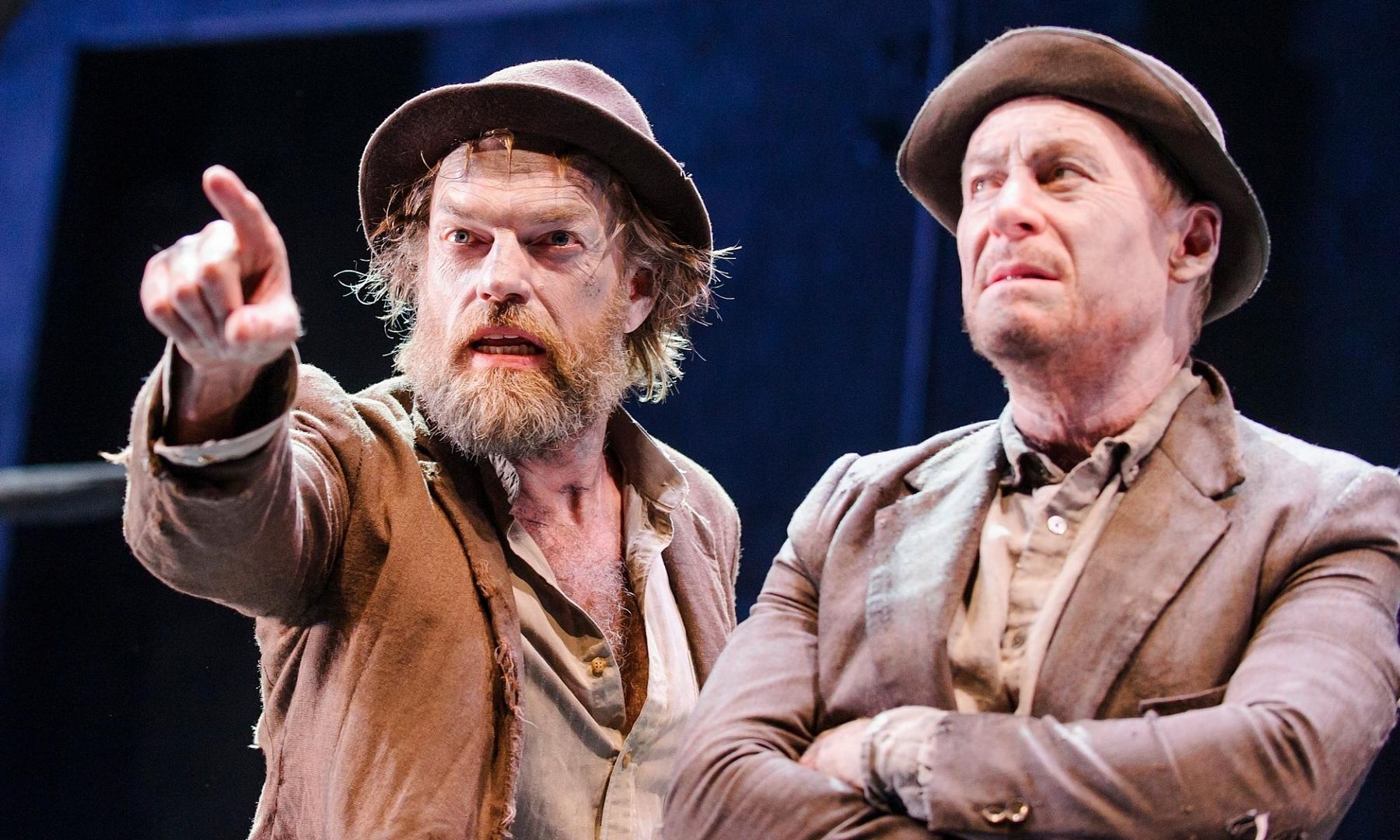
Hugo Weaving and Richard Roxburgh in Waiting for Godot at London's Barbican Photo: Tristram Kenton for The Guardian
Sydney Theatre Company's production of Waiting for Godot starring Hugo Weaving, Richard Roxburgh, Philip Quast and Luke Mullins continues to receive overwhelmingly positive notices as new photos (both from professional photographers and fans) continue to appear. I'll post the latest review excerpts interspersed with these photos, some of which were taken at a cast Q & A following the June 9 performance. All fan photos are shared with their original Twitter or Instagram captions, and all material includes links back to original sources; as always, if you have time, the reviews are well worth reading in their entirety.
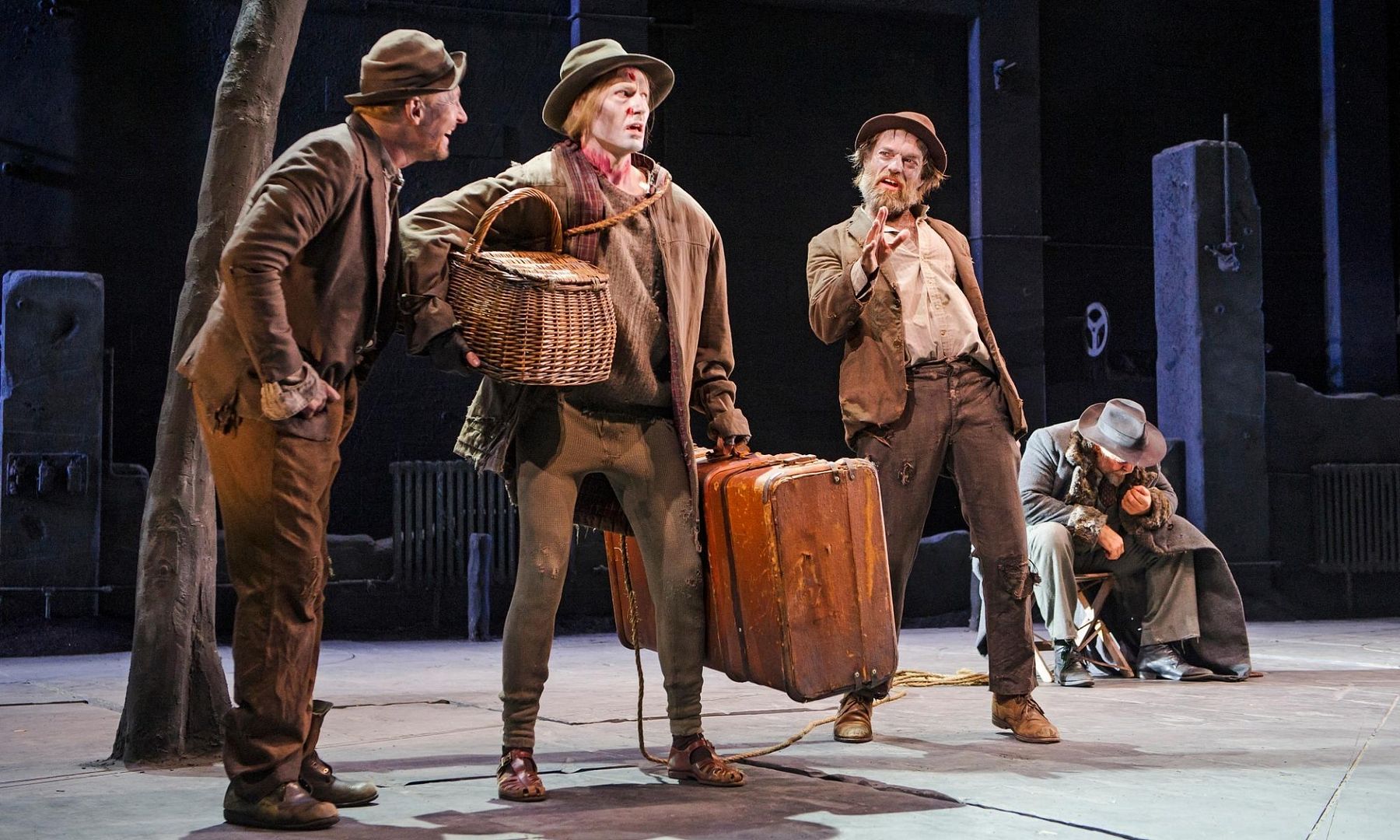
L to R: Richard Roxburgh, Luke Mullins, Hugo Weaving & Philip Quast Photo: Tristram Kenton for The Guardian
Lyn Gardner, The Guardian: "Sydney Theatre Company’s revival, directed by Andrew Upton, turns Beckett into a performance, playing on the idea of theatre, and the pair as a dystopian Laurel and Hardy stranded in what is both clearly a theatre but also an apocalyptic industrial landscape. In Zsolt Khell’s design the back wall of the theatre also suggests the silhouette of a distant blasted city...
This is an evening that is clear, intelligent and boasts real chemistry between Weaving (bearded and unrecognisable from his roles in The Matrix and Lord of the Rings) and Roxburgh. There is something of the big brother, little brother in their relationship, one full of irritations but also an unspoken protective affection as if Weaving’s Vladimir understands their predicament but also knows that they must go on. Will go on. Because that is all they can do. Until darkness falls...
We are always in safe hands here, hands that you might describe as tender in the way they revere Beckett... The vastness of the space creates a sense of our insignificance in the universe, but nonetheless there is a lack of intimacy, even when this Vladimir and Estragon come and sit on the edge of the stage and talk directly to us while simultaneously being unaware of our presence...
It’s a lovely touch in a revival that gropes at the idea that even when we are together in a shared space we are always completely alone and that even as we speak to fill the silence we are smothered by it."
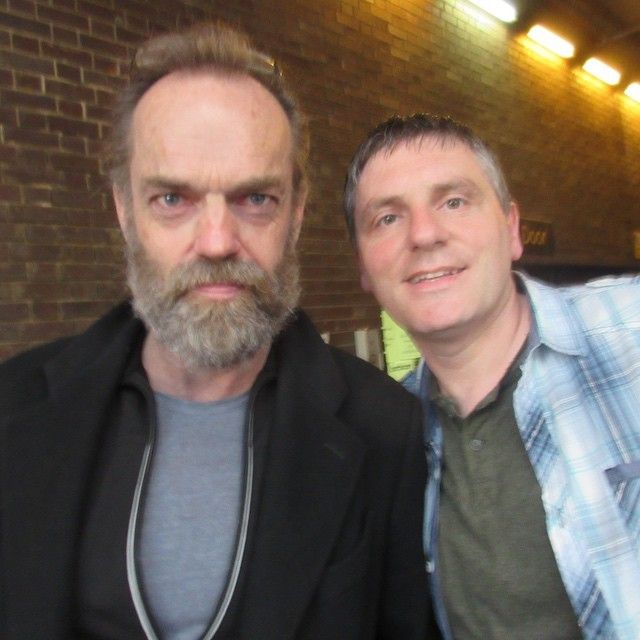
"Over the moon #matrix #lordoftherings #elrond #hugoweaving" Dave Simon via Instagram
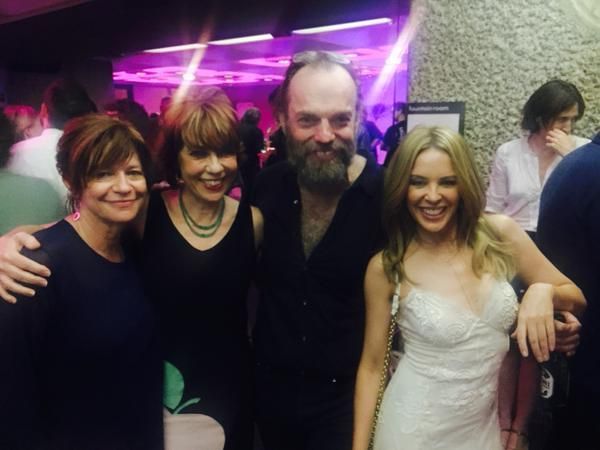
"The wait's over. Finally got Godot thanks 2 fab STC prod. As @kylieminogue said Beckett's about nothing & everything. " Kathy Lette via Twitter
Marianka Swain, The Arts Desk: "...Weaving and Roxburgh join the pantheon of great double acts inhabiting these roles, and, like recent occupants Patrick Stewart and Ian McKellen, stress the vaudevillian nature of the clowning duo. There’s an affectionate intimacy to their interactions: Weaving’s elegant Vladimir catching the hem of rash Estragon’s coat in a practised gesture, like a parent holding back a child from danger; Estragon accidentally mounting him when grappling with Lucky. They share a playful patter that speaks of long experience, exchanging words out of habit rather than to communicate...
Yet the warmth elides some of the distinctions between the two, making them more of a unit than a study in co-dependent contrasts, and occasionally renders this once famously subversive piece rather too comfortable. Thankfully, the symbiotic supporting pair, characterised by an otherworldly physicality, offers a memorably dark mirror; from their arrival onwards, the play’s desperate horror and loneliness become easier to locate. Philip Quast’s bullish Pozzo enters bent backwards almost at right angles as he leads with his expansive midsection, booming voice an overt overcompensation while playing the role of dominant partner. At the other end of the rope, Mullins’ skeletal Lucky judders with each ragged breath, his resting pose a gravity-defying lean, and his commanded movements infinitely strange: cartoonish scuttle on tiptoes, fluttering hands, wild gesticulation as though revving a chainsaw. His bravura monologue is precisely modulated and chillingly dehumanised...
Nick Schlieper’s remorseless lighting is used to great effect, switching instantaneously from harsh steel to engulfing inky blue when night falls. Upton’s production as a whole stops short of plunging us into the abyss, but it does draw a beautifully humane portrait of the connection and comic diversion we crave to keep darkness at bay."
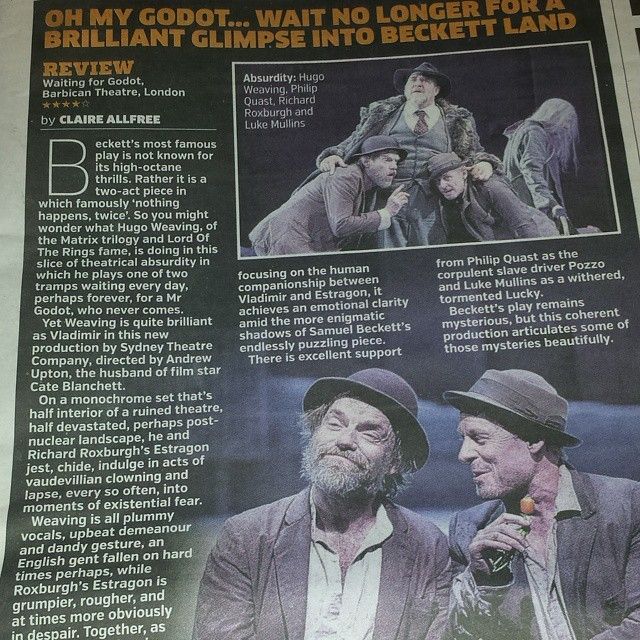
"Great review in the Metro this morning! Huge congrats and i cannot wait to see it tonight!! @sydneytheatreco #stcgodot #stcontour @silviacolloca @colmeen #london #barbicancentre #excited #richardroxburgh #hugoweaving" Jessica Walton via Instagram
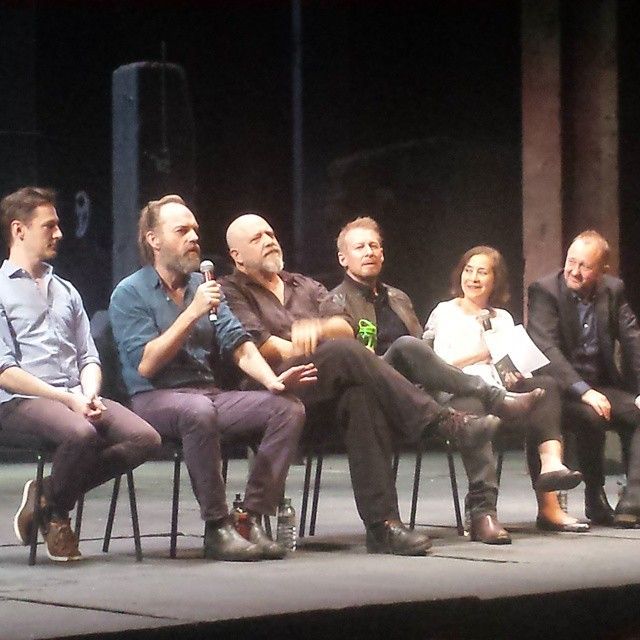
"Finally got to see The Sydney Theatre Co's production of Waiting for Godot last night.....incredible! Just a wonderful production. I was lucky enough to be able to ask a question at the post show talk to #richardroxburgh and get an autograph. Best. Night. Ever. Thank you so much. See you again on Friday and Saturday! @sydneytheatreco #stcgodot #stcontour #barbicancentre #amazing #richardroxburgh #hugoweaving" Jessica Walton via Instagram
Ian Shuttleworth, The Financial Times: "Weaving uses a comparatively posh Anglo-Australian accent as Didi, whereas Richard Roxburgh’s Gogo is far more audibly an Ocker. It works well with Beckett’s script: Estragon often seems much dimmer than the reflective Vladimir but here, while Didi still has the intellectual edge, he is regularly punctured by Gogo’s larrikin bluntness...
As with the McKellen/Stewart production, the pair are here located in the ruins of a building rather than unsheltered on a blasted heath; even the tree on Zsolt Khell’s set seems sturdier than usual and sprouts three whole leaves between the first and second acts. It has been a few years since Philip Quast’s last appearance on a British stage; here, his musical-theatre lungpower stands him in excellent stead as an appealingly bombastic Pozzo. Luke Mullins as Lucky is what my blessed mother would have called 'a big drink of milk', and I mean this as a compliment.
"
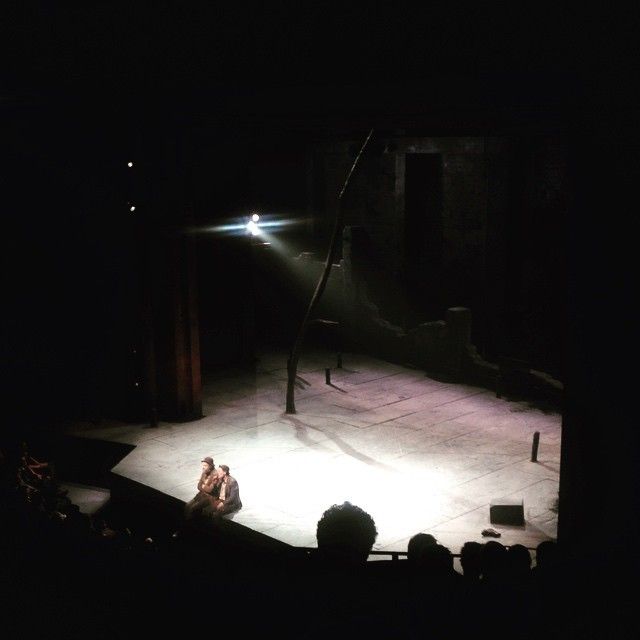
"Waiting for Godot #sydneytheatreco #hugoweaving" Jess Scott-Young via Instagram
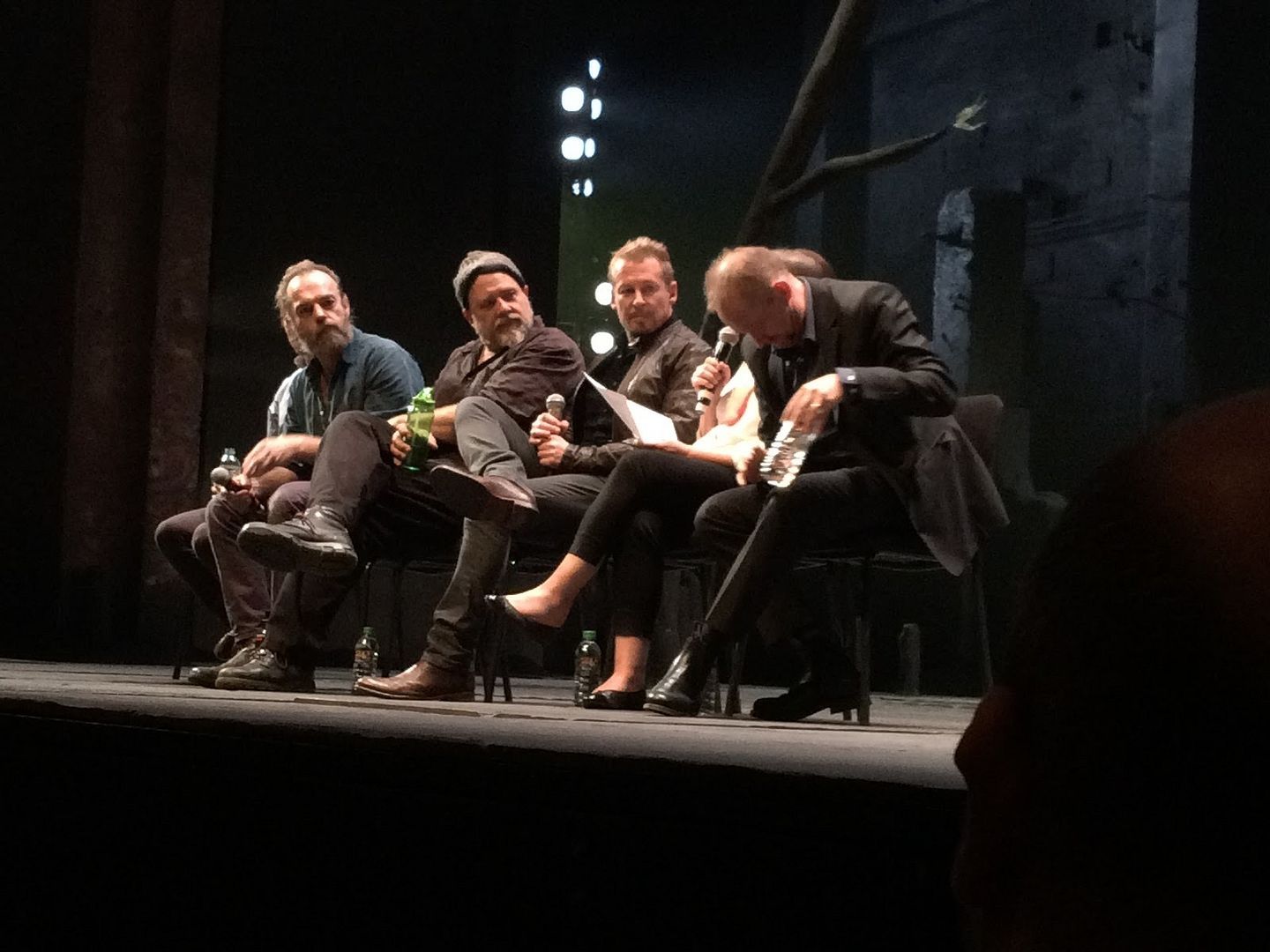
Photo: Candace Brown/Candace in the UK via Blogspot; her account of the performance/Q&A: "I was first exposed to Waiting for Godot last fall in my Irish/English Postcolonial/War Literature class (it was that long of a title, but I've probably butchered it.) with Dr. Maren. That first exposure of reading through it was like carving the front of a sculpture and not the rest. Discussing it in class carved out more of the sculpture on the sides, but it wasn't quite finished. Watching it live last night with HUGO WEAVING as Vladimir, one of the main characters, completely freed the sculpture of my interpretation of Waiting for Godot!...
The question of this play is whether we should cry or laugh as we watch this sorrowful, cyclical plot spiral the main characters deeper into their own despair at the life they have. Vladimir and Estragon live sort of comical lives in their awkward, 'dancy' movements and gestures. Estragon's replies to Vladimir always seem to be sarcastic or merely deprived of hope. For example, when Vladimir (Hugo Weaving- I mean- HUGO WEAVING) would ask Estragon to say, 'We are happy!', Estragon would consent, pause, then say, 'What do we do now that we're happy?'...
The audience laughed, but that moment was so telling of the general mood of the play. The setting is a destitute, dystopian landscape, and the main characters are clowning around like Charlie Chaplin! Happiness comes out in the small moments, like laughing at a truly awful day because it's just uncommonly bad. The audience took every opportunity to laugh at the play because those opportunities seemed that every comical moment was the last of its kind. I believed that they laughed because of the way we live life. We tend to stay 'on the surface', and watching a play where the characters 'tiptoe around the abyss', as Richard Ruxburgh (Estragon) called it in the interview following the play takes us into the unknown waters of complete and utter despair. We stay away from the big questions of life because they interfere with tea time and our daily newspaper read, but this play pushes your head under water and lets you come up for comical air ever so briefly...
After the play was over, we waited to watch an interview with the cast. Our group moved up to the front row! The visual designer talked about how he worked with the actors to come up with their interpretation of the play. He discussed the fact that the humor is there in the play, and it's all about tapping into that humor and letting it come out naturally. The actor who played Pozzo [Philip Quast] talked about the rhythm of the play being one mixed between humor and sorrow, and throwing off that rhythm in one extreme or the other takes away the plays magic. HUGO WEAVING talked about how Richard and he were told 5 years ago to be 'Didi and Gogo' in this play because of the way they masterfully pulled off a somber scene in a play [STC's Uncle Vanya] in 2010.
In other words, this play is complete because it is both a funny tragedy and a tragic comedy. It's in a healthy balance of 'tiptoeing around the abyss' and Charlie-Chaplin-esque humor, which makes for bittersweet entertainment. "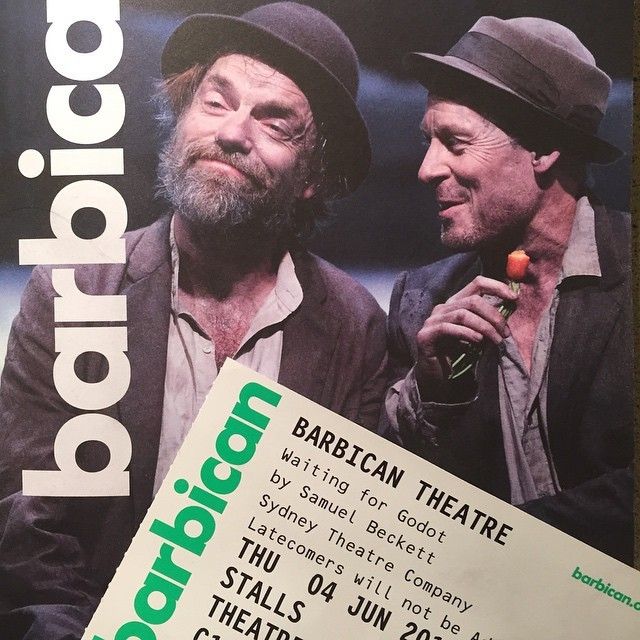
"Waiting for Godot with Hugo Weaving :) #london #theatre #play #barbican #barbican #waitingforgodot #hugoweaving" Annsherry Wang via Instagram
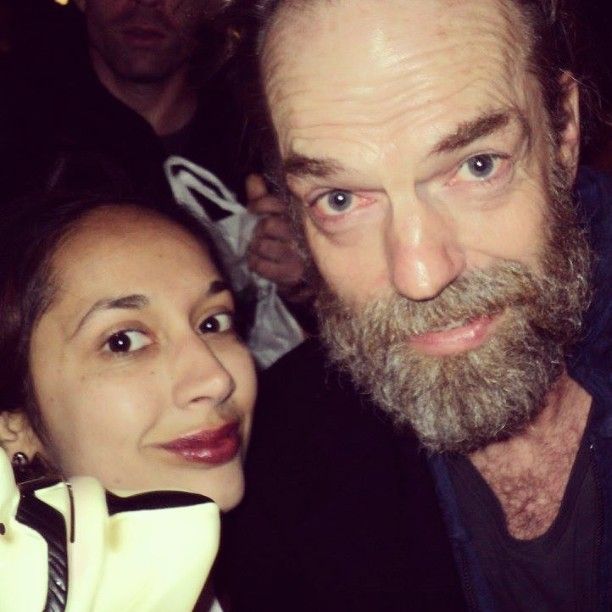
"#HugoWeaving #WaitingForGodot #Barbican I had to ask 3 times before he looked in the right… " Aisling Selvakumaran via Instagram
Fiona Mountford, Evening Standard: "For its International Beckett Season, it is inviting companies and performers from around the world to share the Nobel Laureate’s bleak and powerful wail about existence. The centrepiece of the three-week festival is this superlative production from Sydney Theatre Company, starring Hugo Weaving...
From that memorable first line “Nothing to be done”, Weaving and Roxburgh possess the large, bare space with confidence. They’re a felicitous partnership, at ease and sparking off each other. Weaving, revelling in Beckett’s spare and surprisingly witty language, has a delightfully rumpled grandeur while the equally excellent Roxburgh bursts with a more impatient pragmatism...
Among the many things that Andrew Upton’s supple, confident production gets right are the silences, making them as compelling and thoughtful as the lines that surround them. Interlopers Pozzo (Philip Quast) and Lucky (Luke Mullins) outstay their welcome as ever, but remind us of one of Beckett’s tenets: we might live in a solitary and futile universe but Vladimir and Estragon possess one very precious thing, friendship."
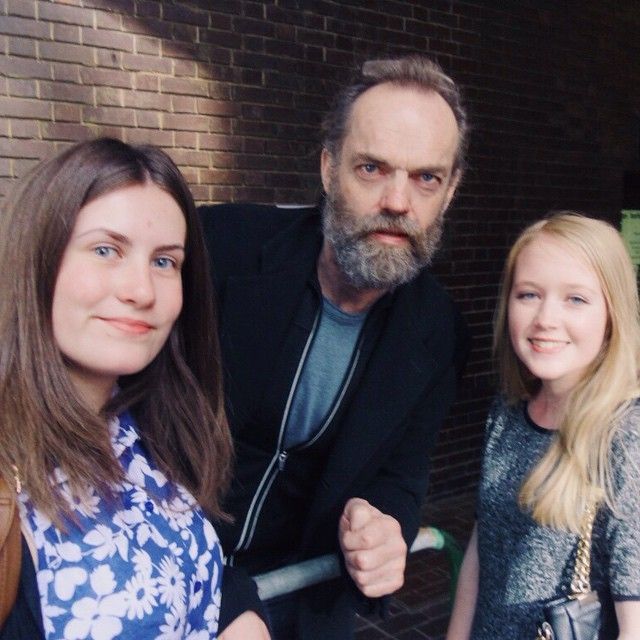
"met Hugo Weaving at the Barbican yesterday after seeing him in Waiting for Godot; such a talented actor & so polite after performing in such an intense show! #HugoWeaving #LordOfTheRings #Barbican #SamuelBeckett" cho.ey via Instagram
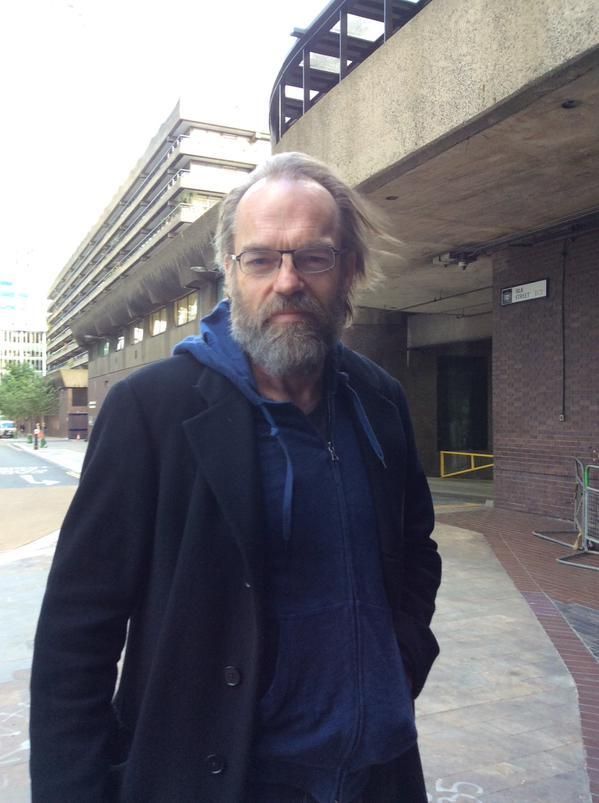
"Am waiting to see 'Waiting For Godot' at @BarbicanCentre and just met Hugo Weaving! @fashionlala" Meg Ellis via Twitter
Neil Dowden, Exeunt Magazine: "60 years on since this iconic play was first staged in this country it has lost none of its power to provoke, puzzle, amuse and move. The tropes of Beckett’s theatrical landscape may have become much more familiar to us but this absurdist tragicomedy in which ‘nothing happens, twice’ still seems timelessly relevant to the human predicament...
Andrew Upton’s entertaining production certainly passes the time quickly (though it would have passed anyway), with much emphasis on the play’s debt to music-hall humour and silent film comedy. Vladimir and Estragon’s banter and slapstick while waiting for the elusive Godot resembles a vagrant double act on the scrap heap clowning about in order to fend off boredom and anxiety, where even talk about hanging themselves is played for gallows humour. There’s a lot of comic business in this highly physical interpretation, like an existentialist version of Laurel and Hardy, swapping battered hats and horsing around in their ill-fitting, bedraggled suits...
But more tenderly they also resemble an old married couple who bicker, sulk and make up, with ‘Didi’ playing the comforter and ‘Gogo’ the more vulnerable one, in a touching display of mutual emotional dependence. They might get annoyed with each other and talk about leaving, but they both know that in the end it is only their companionship that keeps them going in a world devoid of feature or meaning, where one day succeeds another in monotonous anonymity...
Hugo Weaving’s bearded Vladimir, the more patient and philosophical of the pair, has a touch of gentlemanly elegance in his speech and movement, contrasting with Richard Roxburgh’s pessimistic and disgruntled Estragon, who is near the end of his tether - and they bounce of each other with a real feeling of warmth."
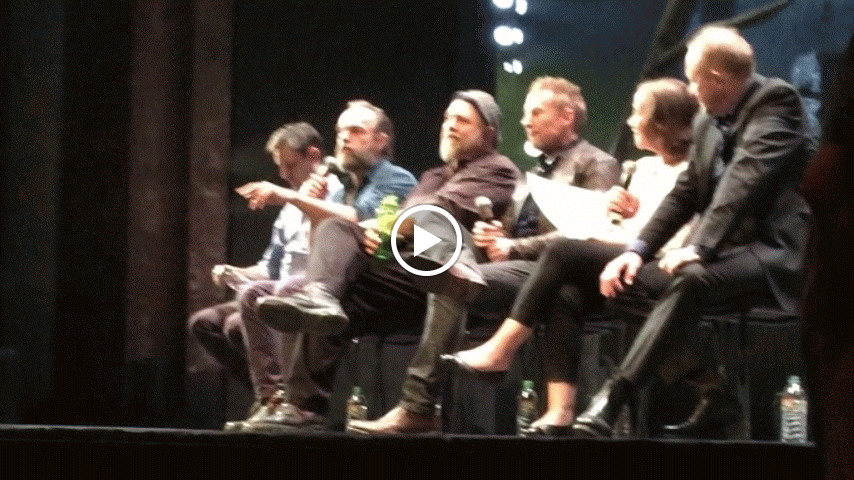
Animation GIF of the cast Q&A session Candace Brown/Candace in the UK via Blogspot
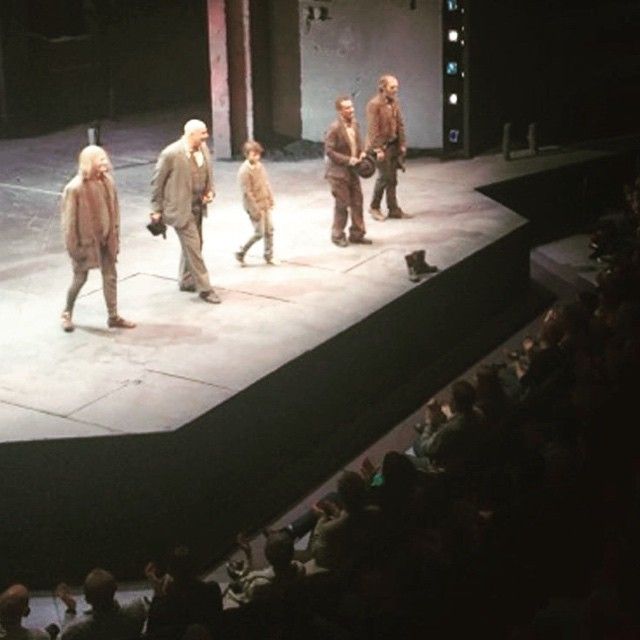
"Awesome to see @SydneyTheatreCo do Waiting for Godot @barbicancentre with #HugoWeaving and #RichardRoxburgh" Tom Donkin via Twitter/Instagram
Mersa Auda, The Upcoming: "Part of the International Beckett season, this rendition of one of the Theatre of the Absurd’s defining works boasts a cast whose rich theatrical and cinematographic repertoires can, in themselves, guarantee a show’s success, and the work does indeed live up to the high expectations...
The audience’s appreciation of the production is felt throughout the show in the form of frequent chuckles and some roaring laughter, and it culminates in a long, warm applause at the end. The chemistry between Hugo Weaving and Richard Roxburgh makes the comedy flow effortlessly, and the play’s harmonious balance between words and silence is given full expression. The result is a gripping performance that honours Beckett’s poetic humour and allows the audience to truly grasp its tragicomical essence. Verdict:



"
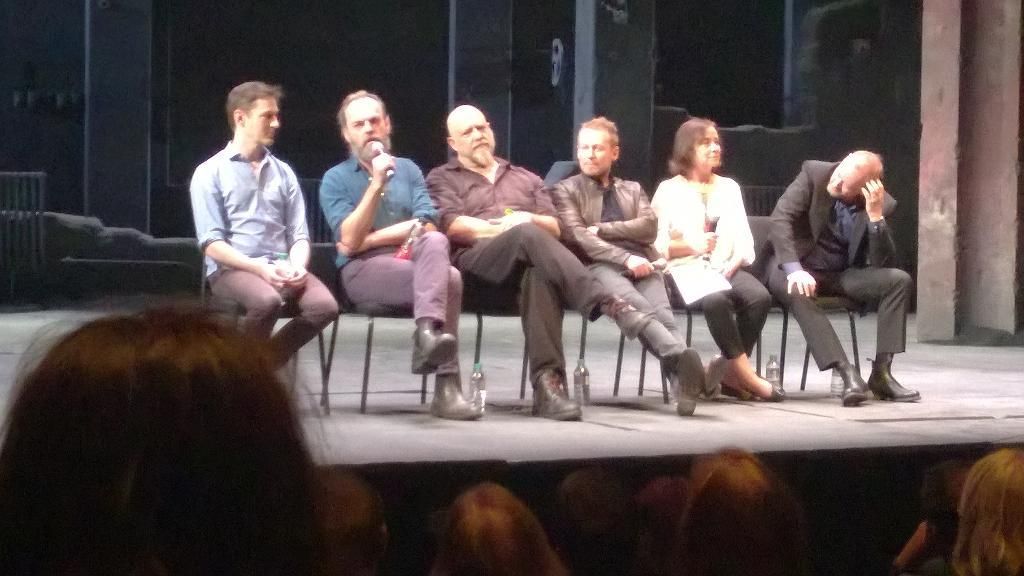
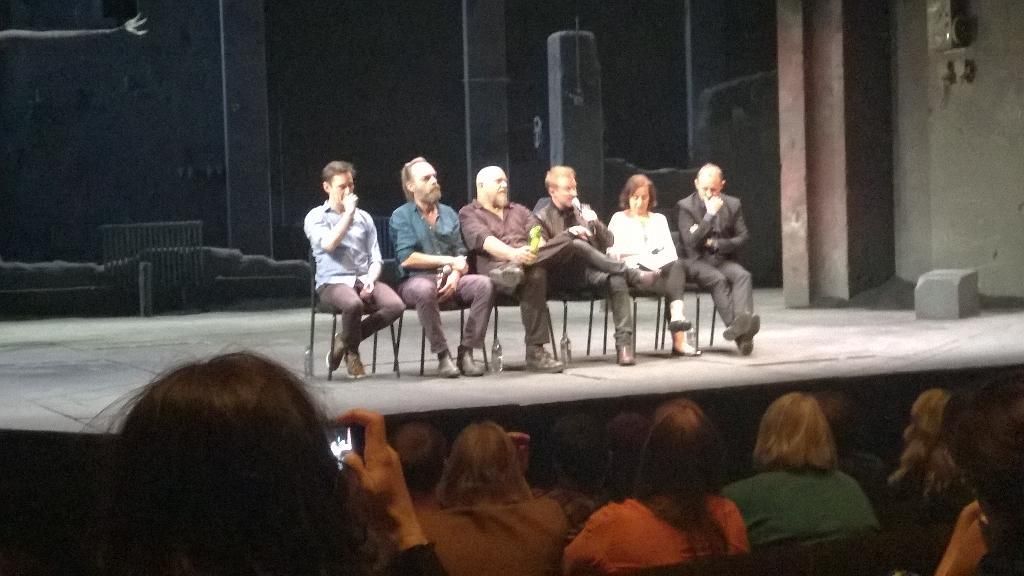
"Waiting For Godot was utterly spectacular. Hugo Weaving & Richard Roxburgh both fantastic, & even a Q&A afterwards! " Charlotte Young via Twitter (both above photos)
Philip Fisher, British Theatre Guide: "Although this interpretation largely conforms to expectations, there is a mildly Australian slant to the production and Upton does make his mark, especially through the physicality of a star cast...
Hugo Weaving as Vladimir and Richard Roxburgh playing Estragon both have lists of film and TV credits as long as your arm... Each is also very well versed in stage work, as soon becomes apparent during the 2¾-hour performance...
The actors make a fine double act as their characters inanely chatter away for some time about their lives and by extension our own, amusing along the way before the arrival of another duo...
Better known on these shores is Philip Quast, who takes the role of Pozzo combining aggression and slapstick in his partnership with Luke Mullins’s Lucky... Mullins is good both with his physical acting in the early stages and a relatively slow-paced speech, enlivened by a considerable amount of stage business from the other actors...
Despite its mystical nature, Waiting for Godot rarely fails to entertain with its mixture of light comedy and highly serious existential probing. This production is well worth a visit to see what Australia’s finest managers to do with the very best that Ireland can offer."
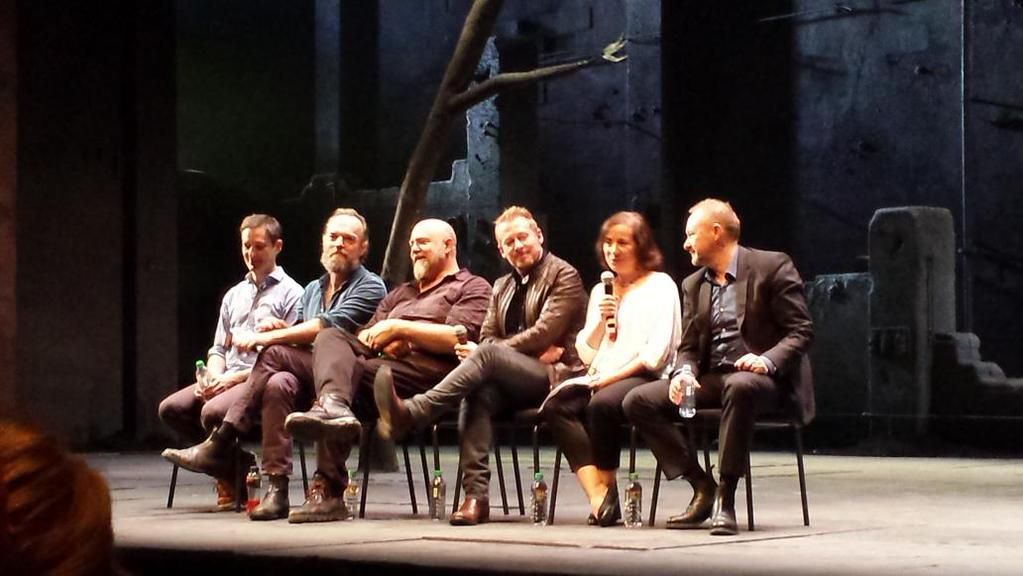
"What luck! Got to see Hugo Weaving & Richard Roxburgh in Waiting for Godot @BarbicanCentre w/the bonus of a talkback " Melanie Lockyer via Twitter
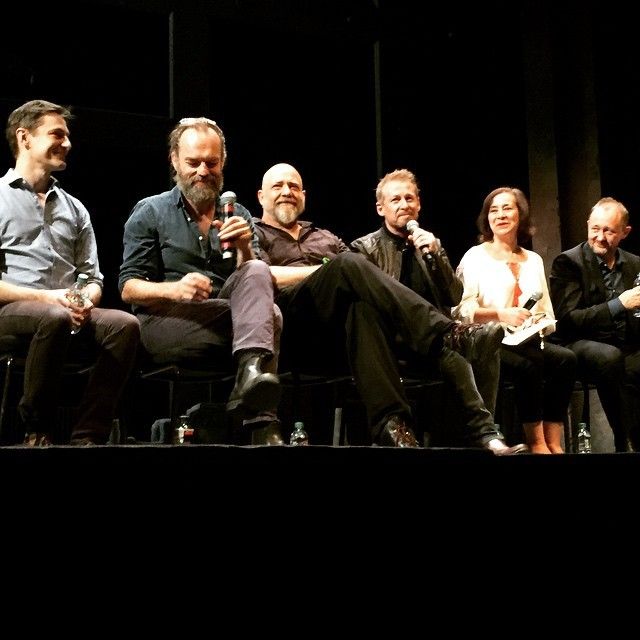
"#WaitingForGodot London Tour Q&A afterwards. #HugoWeaving #RichardRoxburgh #SydneyTheatreCompany" LyridsMC (AKA our Sydney correspondent Yvette) via Instagram
Lydia Lakemoore, A Younger Theatre: "Was I enthralled for those three long hours? You bet I was. Samuel Beckett himself abhorred the need to understand his plays and therefore I adhere to his words and unquestionably sit and watch as two men discuss their shoes being too tight and if they fancy hanging themselves off a weak and feeble tree branch...
Each actor in turn lived up to the fine quality of acting that I have learnt to expect from productions at the Barbican. Richard Roxburgh and Hugo Weaving (well known for The Matrix and The Lord of the Rings) in their roles as Estragon and Vladimir are a pure treat. With delicate madness, subtle humour and carefully controlled absurdity, I have scarcely witnessed such a high calibre of acting. I was lost, immersed and utterly enthralled within the world these fine, experienced actors had created for us. Estragon and Vladimir are such extraordinary complex characters and with less successful direction I can imagine that they could come across as simply mad; too extreme in their characteristics to be seen as genuine. But how can you question a character’s authenticity when it is believed and owed fully and completely by the actor portraying it? That is what was given to me last night. Two extremely heightened characters acted with such precision and delicacy that I never once doubted their authenticity...
The play, like most of Beckett’s work, is a difficult watch, and I would be lying to insinuate anything else. It is long, lacks plot and leaves you with a sense of emptiness, as well as wondering about your own insignificance in this universe. But if a theatre is going to put on a Beckett play, this is how to do it. If you want to see a Beckett play, this is unquestionably the one to watch!"
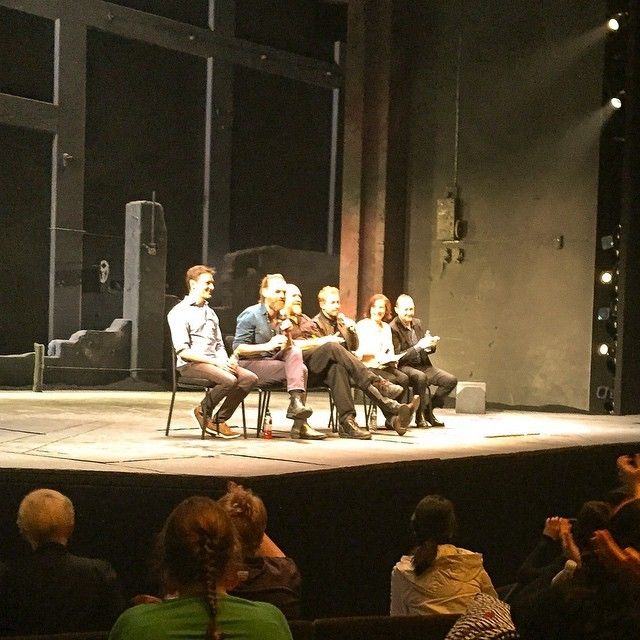
"Waiting for Godot | Sydney Theatre Company | Post-show Q&A. Will copy the cast's warm-up on the tube. #STCGodot #STContour #barbicancentre" Alex Morrison via Instagram
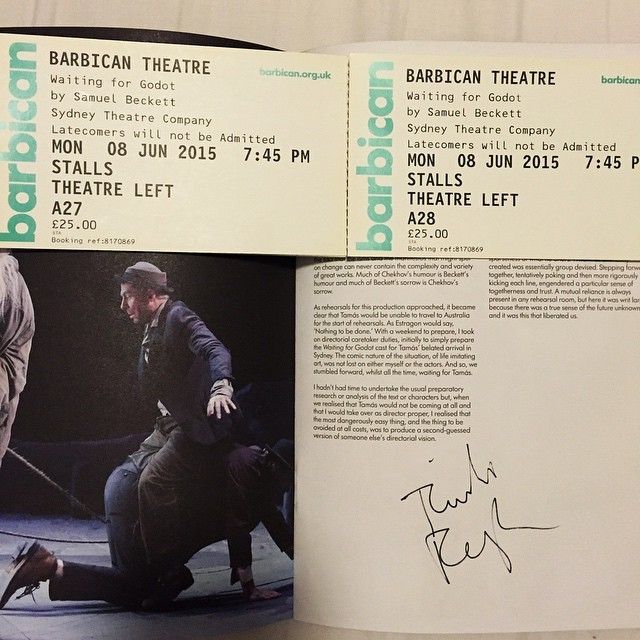
"#WaitingForGodot London Tour. Even better than the Sydney original version. #HugoWeaving #RichardRoxburgh #SydneyTheatreCompany" LyridsMC via Instagram
Will Rees, Londonist: "Accentuating the play’s comic aspects isn’t without its upsides: the physical humour, especially from Philip Quast and Luke Mullins as Pozzo and Lucky, is breathtaking. And Hugo Weaving holds fort as Vladimir, playing him with a lithe, picaresque grace...
The real hero here is Zsolt Khell, the set designer. Beckett’s directions don’t give a set designer much to go on, but Khell has done an admirable job in creating a minimalist set with a gorgeous, monochrome sheen. And while it sounds a little heavy handed, I liked the decision to set the play amid the rubble of a ruined theatre... In the end, it isn’t all laughs. In the second act the play finds its stride, and the horror almost becomes palpable. "
[Some critics did disagree with this production's interpretation Beckett. They tend to be the ones that start off their reviews quoting Plato's Symposium and have a somewhat snide, pretentious tone when addressing aspects of the production that those not confined to an ivory tower might find relatable. Just my impression. For the record, Beckett referenced Buster Keaton alongside Shakespeare in his work and always mixed "low" and "high" art elements ] ;)
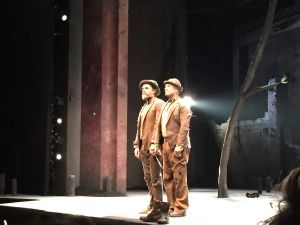
Luhrman, Film-Man: "This week I was lucky enough to sit in the fourth row at the Barbican while Hugo Weaving and Richard Roxburg were on stage playing Vladimir and Estragon in Waiting for Godot under the direction of the great Andrew Upton, artistic director of the Sydney Theatre Company...As the play was coming to an end (Godot still nowhere in sight), I came to think how wealthy of talent Australia is, and how deep my love for this country is (although I still haven’t had a chance to visit it…). " (Plus photo, above)
Honour Bayes, The Stage: "This Waiting for Godot nearly floats off the stage it’s so light and fleet of foot. At nearly three hours, it flies by, but Andrew Upton’s production is anything but flighty. With profound pathos it illuminates the tragic epicentre of Beckett’s masterpiece, shooting arrows into the heart that take hold and won’t come loose...
Richard Roxburgh and Hugo Weaving’s tender partnership is a treasure. Weaving’s Vladimir is a heel clicking, nimble leader, his stance and manner that of a faded rock star. Roxburgh’s Estragon is anything but simple, instead showing an intuitive wisdom that feels more in tune with their bleak world than Vladimir’s cerebral contentions. Together they play the vaudevillian fools beautifully, utterly on beat with each clownish turn...
Verdict: A nimble production of Waiting for Godot that allows Beckett’s astute absurdism to take centre stage. 5 Stars"
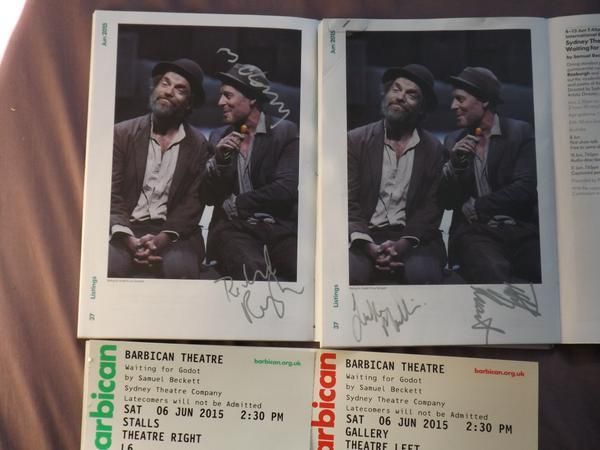
"Signed photos by the cast and the tickets ^.^ " Bella via Twitter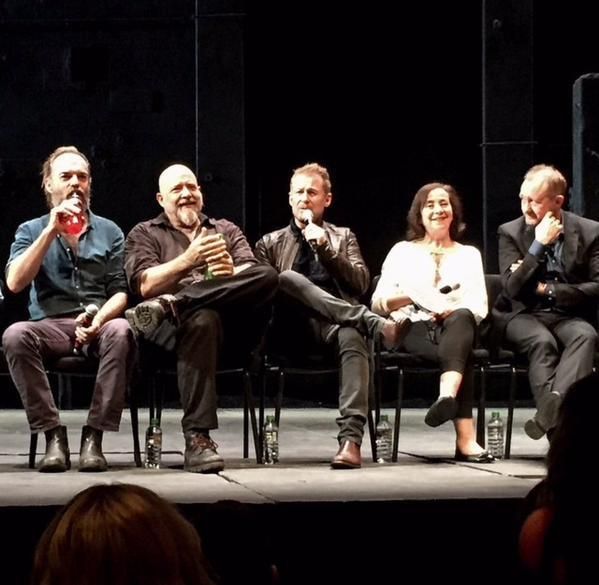
"@prickleandgoo Thank you! #STCGodot " Mia via Twitter
Claire Allfree, Theater News Online: "Beckett’s most famous play is often as notable for its visual impact as its emotional one. This new production for Sydney Theatre Company certainly doesn’t disappoint on that score. Hugo Weaving and Richard Roxburgh’s Vladimir and Estragon are alone in what looks like the remains of a vast, abandoned, windswept theatre. A rusty proscenium arch frames the stage. A crumbing wall with radiators lies in shadow along the back. Yet the space itself is blasted with a freezing white light that throws the bare trunk of the single tree into stark relief. It’s as though a Siberian winter has encroached upon the last remains of civilisation...
It’s not uncommon to cast Vladimir and Estragon as two old music hall veterans, reliving their glory days through an intuitive double act of vaudevillian clowning. There is certainly a strong whiff of that theatricality in Weaving and Roxburgh’s antic physical comedy, although most of the production’s visual references point to the silent movie era rather than the theatre. Yet this Vladimir and Estragon, waiting in fidgety perpetuity for the Godot who never comes, are striking mainly for a beautifully individuated relationship that is as full of warmth and love as it is quarrel and despair. Weaving is surely the most twinkle-eyed Vladimir to grace the stage. He adopts the seemingly unruffled demeanour of the down on his uppers English gent - all plumy vocals and raffish affectation. Adorning that now shapeless, derelict suit was surely once a purple cravat. This Vladimir is a showman, turning each new calamitous aspect of his and Gogo’s unending predicament into an opportunity to be relished, although every so often that carefully held together performance betrays a terrible strain. Roxburgh’s Estragon, by contrast, is coarser, more truculent, more obviously depressed. Yet as these two old dogs pull back and forth over the course of the play, you sense it is love that has kept them together over and above anything else. 'We always find something, eh Didi, to give us the impression we exist?' says Roxburgh’s Estragon. It’s one of the production’s most affirmative moments."
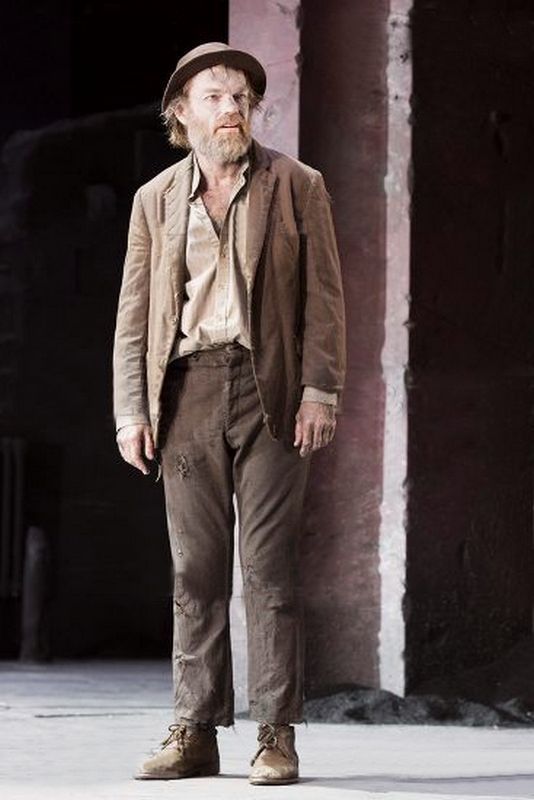
Hugo Weaving in STC's Waiting for Godot, London Barbican Photo: Bettina Strenski/LNP/Rex (plus photo below)
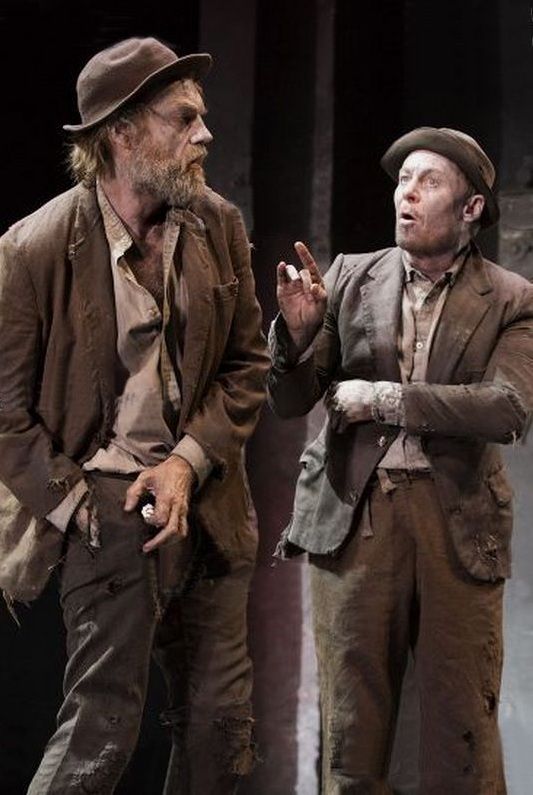
Hugo Weaving and Richard Roxburgh
Fred Fyles, Felix Online: "The small cast, comprising of four main members, is incredibly tight: Richard Roxburgh lends a subtle Australian brogue to his put-upon Estragon, and finds a formidable sparring partner in his companion Vladimir, played by Hugo Weaving. The pair bicker and squabble, enacting out various games, passing the time as they wait for the unseen titular character. How long they have been waiting, how long they will continue to wait, remains a mystery, furthering the sense of alienation the audience finds themselves on the receiving end of. Philip Quast plays the role of Pozzo, who seems to be trapped in his relationship with the put-upon Lucky. Dragged this way and that, near-mute throughout the majority of the play, until he vomits forth a stream of consciousness at the end of Act I, Lucky is perhaps one of the most difficult characters to get right, but Luke Mullins brings an extraordinary physicality to the role...
The English translation of Waiting for Godot is given the subtitle ‘a tragicomedy in two acts’, and in this production the comedic elements are certainly highlighted. Capering around the stage, Roxburgh and Weaving form a brilliant duo, with Vladimir providing a witty foil to Estragon’s more grounded grumbles. "
You can read compilations of these STC Godot reviews and a few others at The Australian and The Sydney Morning Herald.
Here are more 13 more production photos of Godot in London featuring Hugo Weaving as Vladimir, Richard Roxburgh as Estragon, Philip Quast as Pozzo and Luke Mullins as Lucky. All are credited to Bettina Strenski/LNP/Rex.
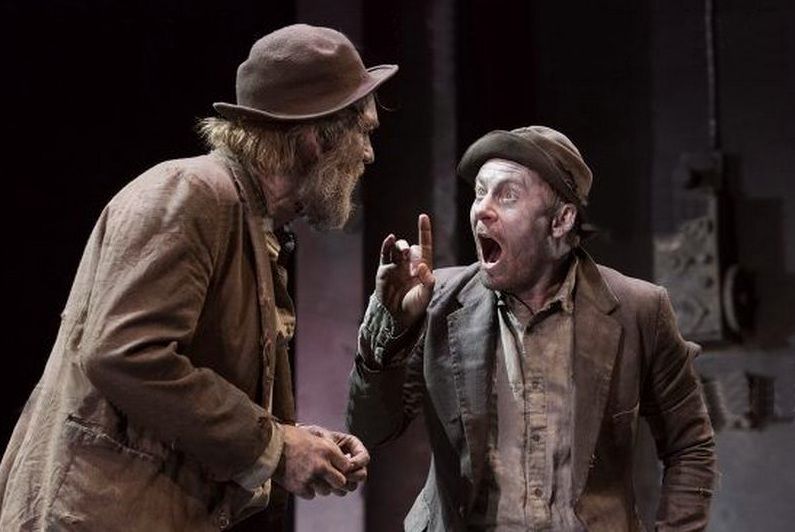
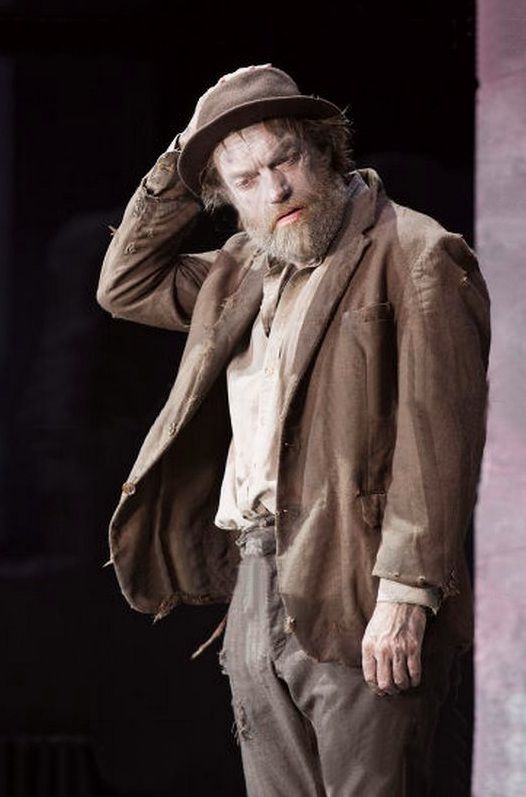
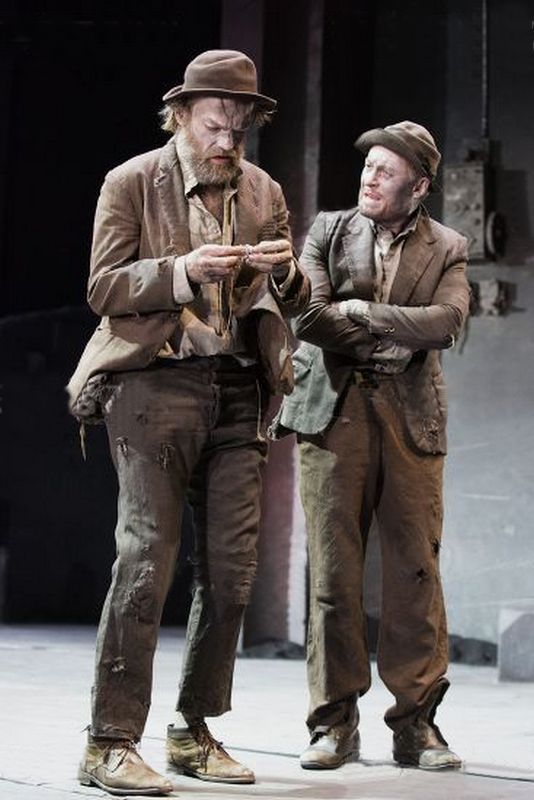

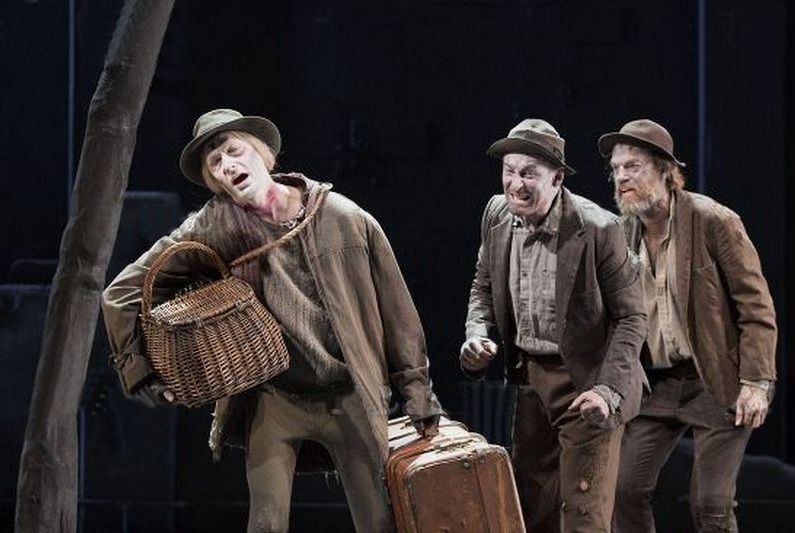
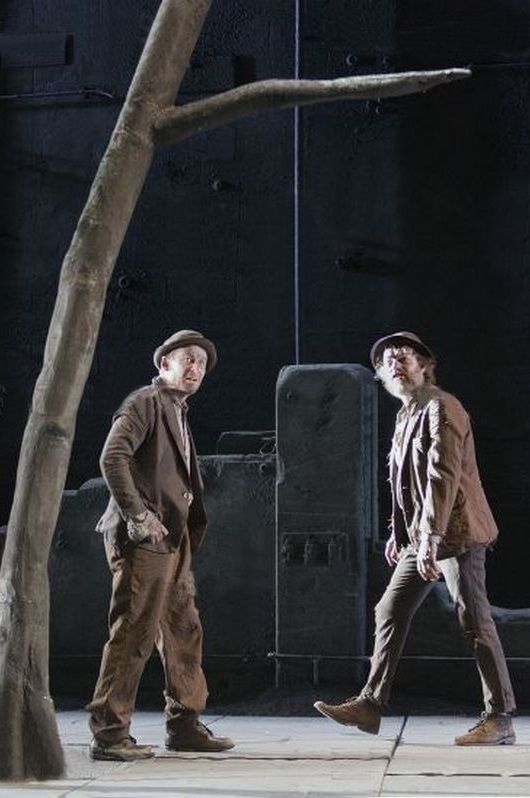
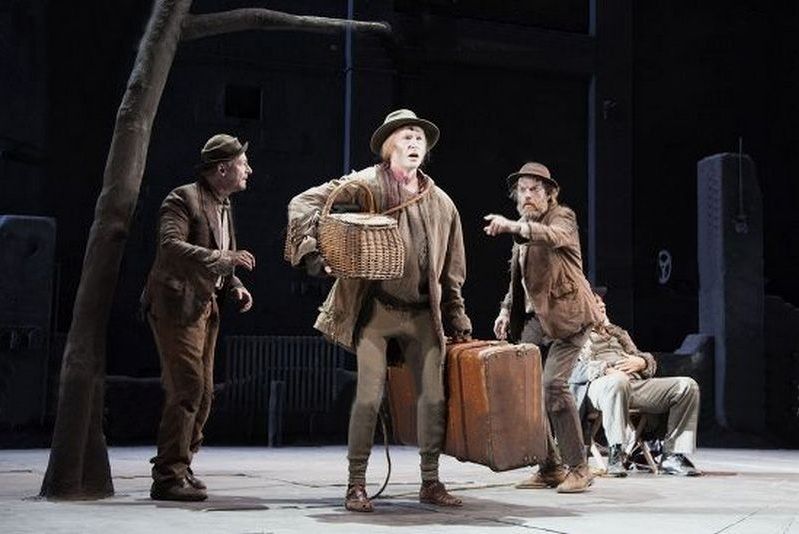
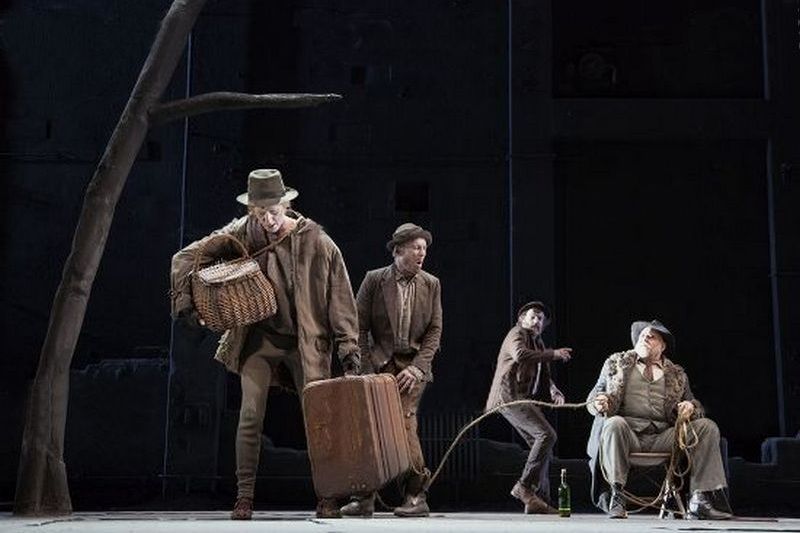
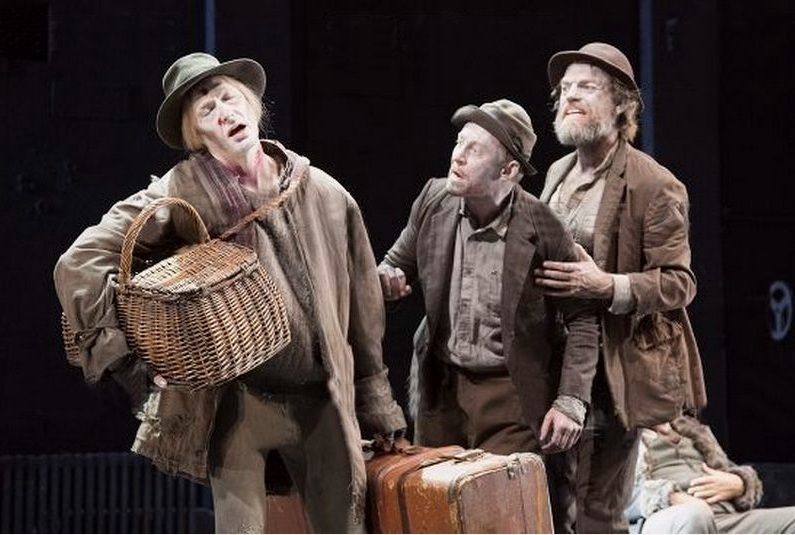
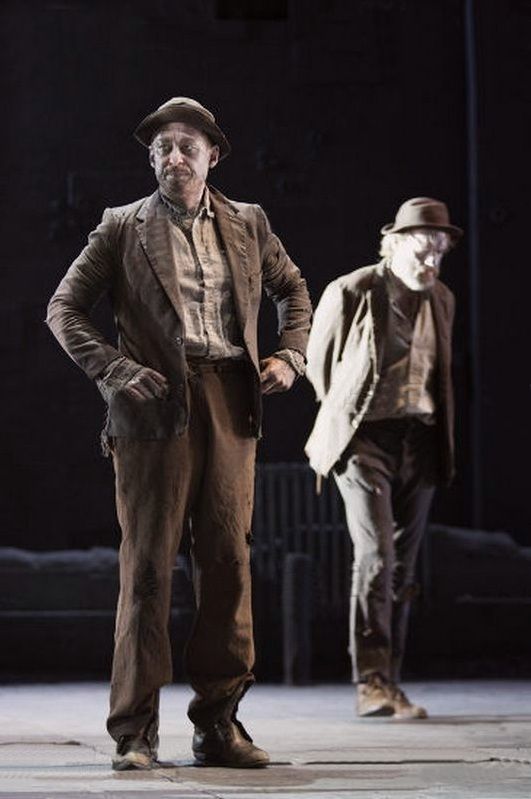

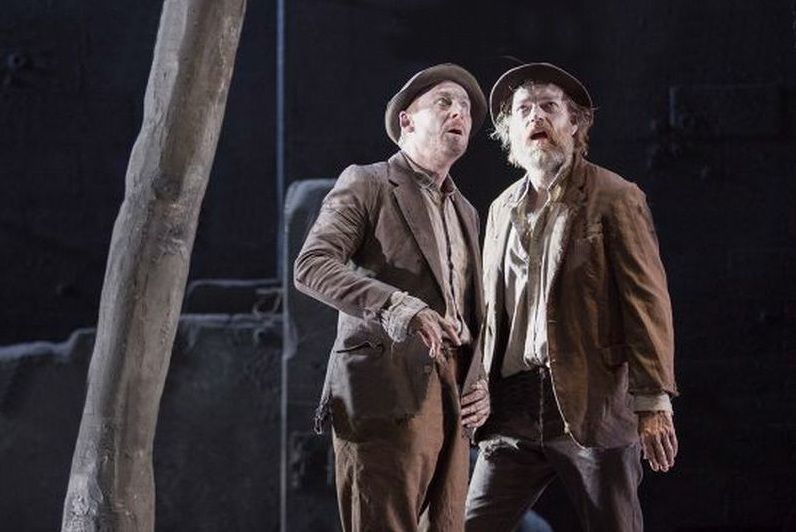
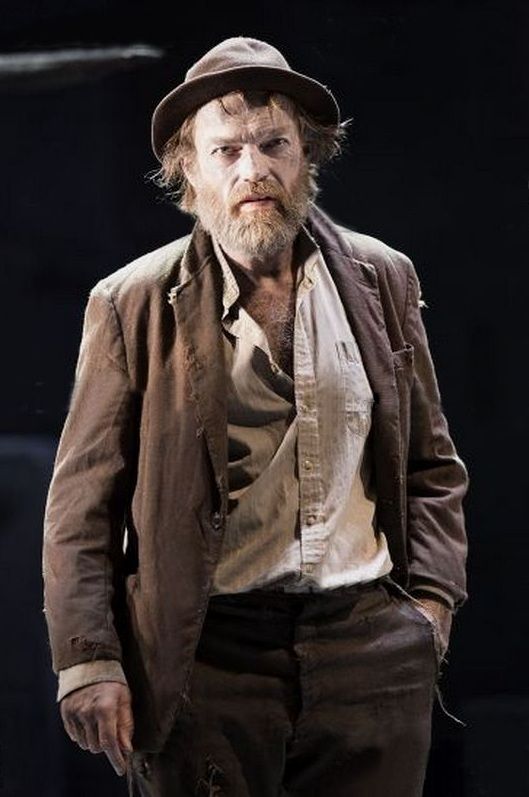
Strangerland Begins Australian Arthouse Run
Strangerland opens wide (well, sorta-wide) in Australia today, slated for a limited arthouse run with many screenings to feature director Kim Farrant Q&A sessions after the film. According to the film's Australian distributor Transmission, it will screen at Palace Cinemas locations for the next week; check here for specific cities and showtimes. Also check out Transmission's website to download a lavish packet of Strangerland-related goodies, including the film's press kit, Australian poster and a gallery ofhigh-res stills. (Files played best on VLC player for me.)
_and_Rae_(Hugo_Weaving)_Hugging_On_Roadside.jpg)
Hugo Weaving and Nicole Kidman in Strangerland, via Transmission (larger version of this image here)
The film's US distributor, Alchemy, is planning a more stripped-down, mostly VOD release with DVD soon to follow. No intel yet on whether the film will actually have any theatrical screenings over here, but there is at least a Facebook page to keep tabs now, and Alchemy has added a subpage at their website. US release is July 10 with DVD/Blu-Ray following on August 18.
Reviews for the film remain mixed though there are a lot more unreserved raves from the Australian critics (though many others still either don't like the film's ambiguity or don't think the theme is satisfyingly played out); the performances are generally drawing praise, though some are on the fence about Joseph Fiennes, depending how they interpret his performance. Here is a sampling of quotes from recent reviews, complete with links to original sources.
Garry Maddox, Sydney Morning Herald: "Rather than conventional storytelling, Farrant is more interested in the impact of the crisis on Christine and Matthew - the way trauma drives them to a primal state and brings out the repressed emotions that have undermined the marriage... It's an enigmatic film that leaves audiences with uneasy questions and hints at a deeper theme about female desire and the connection between grief and sex. (Three stars out of four)"

Alternate poster for the Australian release
Louise Keller, Urban Cinefile: "There's a wonderful mood and sense of place about Kim Farrant's debut feature set in the Australian outback, although the individual parts are more successful than the whole. With a screenplay by Michael Kinirons and Fiona Seres, the film boasts a dream cast..
Resentment, suspicion, fear and frustration are the emotions canvassed, with Kidman terrific as the frustrated wife and mother displaying maximum vulnerability, and Fiennes effective as the stitched up husband and father. There's a nervous energy about both of them... The fact that there is little chemistry between Kidman and Fiennes works in the plot's favour and as the film progresses and Catherine's pent-up sexuality comes into focus, the parallels are drawn between mother and daughter...
The scene in the car in which Hugo Weaving's police officer Rae describes the portrait of his former marriage is one of the most touching moments; Weaving has great depth and heart. Reunited for the first time on screen since Bangkok Hilton (1989), there's real chemistry between Weaving and Kidman. Key characters in the secondary story strands are Meyne Wyatt as Burtie, the young Aboriginal man who wouldn't hurt a fly and Lisa Flanagan as his sister as well as Rae's lover. Both are convincing...
P.J. Dillon's cinematography shows off the harsh, Australian landscape to best advantage and the helicopter shots above the dramatic gorge that looks as though it has been painted in crayons, are stunning. The police search for the missing kids and the mystical elements sit awkwardly."
***
Stephen A Russell, TheLowDownUnder: "Poor old Nicole gets a mighty truckload of shit from her compatriots down under and when you look at rot like Grace of Monaco, it might seem warranted, but I’ve always been fond of her more unhinged turns in psycho-sexual fare like The Paperboy, Stoker and recent thriller Before I Go To Sleep... Kim Farrant’s hypnotic Stangerland falls into the latter category. Kidman stars as Catherine Parker who has just relocated to the fictional Nathgari, a hot and dusty, remote outback town with husband Matthew (Joseph Fiennes, English accent intact) and kids Lily (Maddison Brown) and Tommy (Nicholas Hamilton). There’s a palpable tension simmering under the not very happy family surface here, a skittish unease over barely concealed history, Lynch-style by way of Wake In Fright/Picnic at Hanging Rock...
Inexplicably, this is only the second time Weaving and Kidman have shared the big screen, with the first being 1989’s Bangkok Hotel. There’s a burning fire between them that’s purposefully missing from her screen-time with Fiennes. Hints of Lindy Chamberlain’s travails eventually lead home and as Catherine unravels, her fate is seemingly bound to her daughter’s illicit sexual escapades...
All of this confusion and sexual tension plays out against the striking backdrop of simultaneous beauty and niggling horror evoked by cinematographer PJ Dillon’s sweeping helicopter shots and extreme close ups of the scorched earth and small creatures of Australia’s red centre...
The script, from Fiona Seres and Michael Kinirons, gets stuck in a few repetitive beats, failing to fully capitalise on a few interesting angles, particularly an overt reference to the Rainbow Serpent from Coreen and the ominous warnings her grandmother who notes that sometimes children simply disappear here, but Farrant manages to cast a menacing spell nonetheless...
Kidman in particular is on fine form, showing once again proving she’s more suited to this sort of emotionally and morally complex material than the Hollywood starlet gigs, with a final act unveiling showing a quite admirable bravery." (Three and a half stars)
***
Paul Byrnes, Sydney Morning Herald: "If ever there was an Australian film struggling to get out from under the burden of its manifold meanings and themes, this is it. It's a pity, because there is a lot of talent on show. Farrant does a fine job with the sense of dread, and the performances. Weaving gives a superb grounded weight to his portrait of a cop trying to be the voice of reason. Kidman's pain is palpable, bound up with self-doubt and blazing anger. Fiennes makes the least likeable character understandable, even pitiable."
***
Richard Gray, The Reel Bits: "Resolutions don’t come easy in STRANGERLAND, but it is nevertheless a gripping film from start to finish. Against some gorgeous photography by P.J. Dillon (recently of TV’s Vikings), the leads work with a lightly scripted film, where it is more about visceral reaction than subtle character development. Kidman gives one of her finer performances as she descends into anguish, surprising us several times along the way with emotional, sexual and sometimes violent outbursts. Fiennes is restrained as the pharmacist husband, who exhibits an indifference that is equal parts frustrating and understated stoicism. Of particular note is Meyne Wyatt (Neighbours), who has a award-worthy performance as the intellectually disabled Bertie. There are certainly elements that don’t entirely work, including some tacked on rainbow serpent spiritualism in the back half of the film that strives for Picnic at Hanging Rock mystery. It’s a plot thread that seems redundant by the end, but it doesn’t detract from the emotionally raw and captivating journey this film takes us on." (9 out of 10 stars)
***
Edward Curtis, The Film Blerg: "The film contains some impressive performances from homegrown talent and expected quality from its known stars. Lisa Flanagan and Meyne Wyatt play Burtie and Coreen, a brother and sister who have more association with the Parker family than anyone else in the town. Brown and Hamilton have a certain sibling chemistry that demonstrates their solace in sharing one another’s company. Fiennes and Weaving both represent strong opposing characters doing their separate duties, as one man falls apart, the other must piece together the facts. However, it is Kidman’s performance that stands out, with the anguish and destruction of Catherine being so seamless it surpasses the film’s plot into some sorrowful territory.
On the whole, it is the major components of Strangerland that don’t quite fit together, being a police procedural film wanting to explore the destruction of this family. Whilst not an inconceivable approach, with Prisoners being the perfect example, Strangerland is at times not sure which theme it wants us to invest in more. By creating this imbalance between the two structures it leaves for a slightly underwhelming experience...
Strangerland is bold, thought provoking and an accomplished film from first-time feature director Kim Farrant. Whose skills show her ability to get some great performances from a range of different actors, as well as taking on some interesting subject matter. Given some solid working material there’s no doubt Farrant has a lot more in store for the years to come."
***
There are positive-leaning audio reviews by CJ Johnson (702Sydney/ABC) and Matthew Toomey (612Brisbane/ABC)
You can read Kim Farrant's interviews about making the film, how she incorporated highly personal themes and how she's gauging the varied audience response at IndieWire, RTRFM (audio interview), Scenestr., The Sydney Morning Herald and ABC Arts.
You can see behind the scenes video, including interviews with Farrant and Kidman, at Yahoo7 (includes footage of Hugo filming in Canowindra), The Courier Mail and MSNNews Ten.
There's an article about a screening of the film for Canowindra residents, many of whom played extras, at Central Western Daily.

Hugo Weaving and Sean Kennan filming Strangerland in Canowindra last year. My still from Yahoo7 video
Between a Frock and A Hard Place
Priscilla fans will rejoice in the news of a brand new documentary film celebrating the making of The Adventures of Priscilla, Queen of the Desert. The film, entitled Between a Frock and a Hard Place, will air on Australian TV 18 June at 8.30 on ABC, followed by a DVD release July 8. Though we've seen several Priscilla-related docs and behind the scenes featurettes (including the full-length Ladies Please doc and several shorter pieces which accompanied various DVD/Blu-Ray issues) this sounds more comprehensive, and will feature interviews with director Stephan Elloitt and actors Terence Stamp, Hugo Weaving and Guy Pearce. (No specifics on whether these are new interviews, but some program stills of Elliott definitely look recent.) Stamp narrates. More info at Impulse Gamer, Arts Review, Nelbie and Same Same, which details a special live Q&A to follow the doc, which will address changing cultural attitudes to LGBT issues.

Hugo Weaving as Mitzi

Hugo Weaving and Richard Roxburgh in Waiting for Godot at London's Barbican Photo: Tristram Kenton for The Guardian
Sydney Theatre Company's production of Waiting for Godot starring Hugo Weaving, Richard Roxburgh, Philip Quast and Luke Mullins continues to receive overwhelmingly positive notices as new photos (both from professional photographers and fans) continue to appear. I'll post the latest review excerpts interspersed with these photos, some of which were taken at a cast Q & A following the June 9 performance. All fan photos are shared with their original Twitter or Instagram captions, and all material includes links back to original sources; as always, if you have time, the reviews are well worth reading in their entirety.

L to R: Richard Roxburgh, Luke Mullins, Hugo Weaving & Philip Quast Photo: Tristram Kenton for The Guardian
Lyn Gardner, The Guardian: "Sydney Theatre Company’s revival, directed by Andrew Upton, turns Beckett into a performance, playing on the idea of theatre, and the pair as a dystopian Laurel and Hardy stranded in what is both clearly a theatre but also an apocalyptic industrial landscape. In Zsolt Khell’s design the back wall of the theatre also suggests the silhouette of a distant blasted city...
This is an evening that is clear, intelligent and boasts real chemistry between Weaving (bearded and unrecognisable from his roles in The Matrix and Lord of the Rings) and Roxburgh. There is something of the big brother, little brother in their relationship, one full of irritations but also an unspoken protective affection as if Weaving’s Vladimir understands their predicament but also knows that they must go on. Will go on. Because that is all they can do. Until darkness falls...
We are always in safe hands here, hands that you might describe as tender in the way they revere Beckett... The vastness of the space creates a sense of our insignificance in the universe, but nonetheless there is a lack of intimacy, even when this Vladimir and Estragon come and sit on the edge of the stage and talk directly to us while simultaneously being unaware of our presence...
It’s a lovely touch in a revival that gropes at the idea that even when we are together in a shared space we are always completely alone and that even as we speak to fill the silence we are smothered by it."

"Over the moon #matrix #lordoftherings #elrond #hugoweaving" Dave Simon via Instagram

"The wait's over. Finally got Godot thanks 2 fab STC prod. As @kylieminogue said Beckett's about nothing & everything. " Kathy Lette via Twitter
Marianka Swain, The Arts Desk: "...Weaving and Roxburgh join the pantheon of great double acts inhabiting these roles, and, like recent occupants Patrick Stewart and Ian McKellen, stress the vaudevillian nature of the clowning duo. There’s an affectionate intimacy to their interactions: Weaving’s elegant Vladimir catching the hem of rash Estragon’s coat in a practised gesture, like a parent holding back a child from danger; Estragon accidentally mounting him when grappling with Lucky. They share a playful patter that speaks of long experience, exchanging words out of habit rather than to communicate...
Yet the warmth elides some of the distinctions between the two, making them more of a unit than a study in co-dependent contrasts, and occasionally renders this once famously subversive piece rather too comfortable. Thankfully, the symbiotic supporting pair, characterised by an otherworldly physicality, offers a memorably dark mirror; from their arrival onwards, the play’s desperate horror and loneliness become easier to locate. Philip Quast’s bullish Pozzo enters bent backwards almost at right angles as he leads with his expansive midsection, booming voice an overt overcompensation while playing the role of dominant partner. At the other end of the rope, Mullins’ skeletal Lucky judders with each ragged breath, his resting pose a gravity-defying lean, and his commanded movements infinitely strange: cartoonish scuttle on tiptoes, fluttering hands, wild gesticulation as though revving a chainsaw. His bravura monologue is precisely modulated and chillingly dehumanised...
Nick Schlieper’s remorseless lighting is used to great effect, switching instantaneously from harsh steel to engulfing inky blue when night falls. Upton’s production as a whole stops short of plunging us into the abyss, but it does draw a beautifully humane portrait of the connection and comic diversion we crave to keep darkness at bay."

"Great review in the Metro this morning! Huge congrats and i cannot wait to see it tonight!! @sydneytheatreco #stcgodot #stcontour @silviacolloca @colmeen #london #barbicancentre #excited #richardroxburgh #hugoweaving" Jessica Walton via Instagram

"Finally got to see The Sydney Theatre Co's production of Waiting for Godot last night.....incredible! Just a wonderful production. I was lucky enough to be able to ask a question at the post show talk to #richardroxburgh and get an autograph. Best. Night. Ever. Thank you so much. See you again on Friday and Saturday! @sydneytheatreco #stcgodot #stcontour #barbicancentre #amazing #richardroxburgh #hugoweaving" Jessica Walton via Instagram
Ian Shuttleworth, The Financial Times: "Weaving uses a comparatively posh Anglo-Australian accent as Didi, whereas Richard Roxburgh’s Gogo is far more audibly an Ocker. It works well with Beckett’s script: Estragon often seems much dimmer than the reflective Vladimir but here, while Didi still has the intellectual edge, he is regularly punctured by Gogo’s larrikin bluntness...
As with the McKellen/Stewart production, the pair are here located in the ruins of a building rather than unsheltered on a blasted heath; even the tree on Zsolt Khell’s set seems sturdier than usual and sprouts three whole leaves between the first and second acts. It has been a few years since Philip Quast’s last appearance on a British stage; here, his musical-theatre lungpower stands him in excellent stead as an appealingly bombastic Pozzo. Luke Mullins as Lucky is what my blessed mother would have called 'a big drink of milk', and I mean this as a compliment.

"

"Waiting for Godot #sydneytheatreco #hugoweaving" Jess Scott-Young via Instagram

Photo: Candace Brown/Candace in the UK via Blogspot; her account of the performance/Q&A: "I was first exposed to Waiting for Godot last fall in my Irish/English Postcolonial/War Literature class (it was that long of a title, but I've probably butchered it.) with Dr. Maren. That first exposure of reading through it was like carving the front of a sculpture and not the rest. Discussing it in class carved out more of the sculpture on the sides, but it wasn't quite finished. Watching it live last night with HUGO WEAVING as Vladimir, one of the main characters, completely freed the sculpture of my interpretation of Waiting for Godot!...
The question of this play is whether we should cry or laugh as we watch this sorrowful, cyclical plot spiral the main characters deeper into their own despair at the life they have. Vladimir and Estragon live sort of comical lives in their awkward, 'dancy' movements and gestures. Estragon's replies to Vladimir always seem to be sarcastic or merely deprived of hope. For example, when Vladimir (Hugo Weaving- I mean- HUGO WEAVING) would ask Estragon to say, 'We are happy!', Estragon would consent, pause, then say, 'What do we do now that we're happy?'...
The audience laughed, but that moment was so telling of the general mood of the play. The setting is a destitute, dystopian landscape, and the main characters are clowning around like Charlie Chaplin! Happiness comes out in the small moments, like laughing at a truly awful day because it's just uncommonly bad. The audience took every opportunity to laugh at the play because those opportunities seemed that every comical moment was the last of its kind. I believed that they laughed because of the way we live life. We tend to stay 'on the surface', and watching a play where the characters 'tiptoe around the abyss', as Richard Ruxburgh (Estragon) called it in the interview following the play takes us into the unknown waters of complete and utter despair. We stay away from the big questions of life because they interfere with tea time and our daily newspaper read, but this play pushes your head under water and lets you come up for comical air ever so briefly...
After the play was over, we waited to watch an interview with the cast. Our group moved up to the front row! The visual designer talked about how he worked with the actors to come up with their interpretation of the play. He discussed the fact that the humor is there in the play, and it's all about tapping into that humor and letting it come out naturally. The actor who played Pozzo [Philip Quast] talked about the rhythm of the play being one mixed between humor and sorrow, and throwing off that rhythm in one extreme or the other takes away the plays magic. HUGO WEAVING talked about how Richard and he were told 5 years ago to be 'Didi and Gogo' in this play because of the way they masterfully pulled off a somber scene in a play [STC's Uncle Vanya] in 2010.
In other words, this play is complete because it is both a funny tragedy and a tragic comedy. It's in a healthy balance of 'tiptoeing around the abyss' and Charlie-Chaplin-esque humor, which makes for bittersweet entertainment. "

"Waiting for Godot with Hugo Weaving :) #london #theatre #play #barbican #barbican #waitingforgodot #hugoweaving" Annsherry Wang via Instagram

"#HugoWeaving #WaitingForGodot #Barbican I had to ask 3 times before he looked in the right… " Aisling Selvakumaran via Instagram
Fiona Mountford, Evening Standard: "For its International Beckett Season, it is inviting companies and performers from around the world to share the Nobel Laureate’s bleak and powerful wail about existence. The centrepiece of the three-week festival is this superlative production from Sydney Theatre Company, starring Hugo Weaving...
From that memorable first line “Nothing to be done”, Weaving and Roxburgh possess the large, bare space with confidence. They’re a felicitous partnership, at ease and sparking off each other. Weaving, revelling in Beckett’s spare and surprisingly witty language, has a delightfully rumpled grandeur while the equally excellent Roxburgh bursts with a more impatient pragmatism...
Among the many things that Andrew Upton’s supple, confident production gets right are the silences, making them as compelling and thoughtful as the lines that surround them. Interlopers Pozzo (Philip Quast) and Lucky (Luke Mullins) outstay their welcome as ever, but remind us of one of Beckett’s tenets: we might live in a solitary and futile universe but Vladimir and Estragon possess one very precious thing, friendship."

"met Hugo Weaving at the Barbican yesterday after seeing him in Waiting for Godot; such a talented actor & so polite after performing in such an intense show! #HugoWeaving #LordOfTheRings #Barbican #SamuelBeckett" cho.ey via Instagram

"Am waiting to see 'Waiting For Godot' at @BarbicanCentre and just met Hugo Weaving! @fashionlala" Meg Ellis via Twitter
Neil Dowden, Exeunt Magazine: "60 years on since this iconic play was first staged in this country it has lost none of its power to provoke, puzzle, amuse and move. The tropes of Beckett’s theatrical landscape may have become much more familiar to us but this absurdist tragicomedy in which ‘nothing happens, twice’ still seems timelessly relevant to the human predicament...
Andrew Upton’s entertaining production certainly passes the time quickly (though it would have passed anyway), with much emphasis on the play’s debt to music-hall humour and silent film comedy. Vladimir and Estragon’s banter and slapstick while waiting for the elusive Godot resembles a vagrant double act on the scrap heap clowning about in order to fend off boredom and anxiety, where even talk about hanging themselves is played for gallows humour. There’s a lot of comic business in this highly physical interpretation, like an existentialist version of Laurel and Hardy, swapping battered hats and horsing around in their ill-fitting, bedraggled suits...
But more tenderly they also resemble an old married couple who bicker, sulk and make up, with ‘Didi’ playing the comforter and ‘Gogo’ the more vulnerable one, in a touching display of mutual emotional dependence. They might get annoyed with each other and talk about leaving, but they both know that in the end it is only their companionship that keeps them going in a world devoid of feature or meaning, where one day succeeds another in monotonous anonymity...
Hugo Weaving’s bearded Vladimir, the more patient and philosophical of the pair, has a touch of gentlemanly elegance in his speech and movement, contrasting with Richard Roxburgh’s pessimistic and disgruntled Estragon, who is near the end of his tether - and they bounce of each other with a real feeling of warmth."

Animation GIF of the cast Q&A session Candace Brown/Candace in the UK via Blogspot

"Awesome to see @SydneyTheatreCo do Waiting for Godot @barbicancentre with #HugoWeaving and #RichardRoxburgh" Tom Donkin via Twitter/Instagram
Mersa Auda, The Upcoming: "Part of the International Beckett season, this rendition of one of the Theatre of the Absurd’s defining works boasts a cast whose rich theatrical and cinematographic repertoires can, in themselves, guarantee a show’s success, and the work does indeed live up to the high expectations...
The audience’s appreciation of the production is felt throughout the show in the form of frequent chuckles and some roaring laughter, and it culminates in a long, warm applause at the end. The chemistry between Hugo Weaving and Richard Roxburgh makes the comedy flow effortlessly, and the play’s harmonious balance between words and silence is given full expression. The result is a gripping performance that honours Beckett’s poetic humour and allows the audience to truly grasp its tragicomical essence. Verdict:




"


"Waiting For Godot was utterly spectacular. Hugo Weaving & Richard Roxburgh both fantastic, & even a Q&A afterwards! " Charlotte Young via Twitter (both above photos)
Philip Fisher, British Theatre Guide: "Although this interpretation largely conforms to expectations, there is a mildly Australian slant to the production and Upton does make his mark, especially through the physicality of a star cast...
Hugo Weaving as Vladimir and Richard Roxburgh playing Estragon both have lists of film and TV credits as long as your arm... Each is also very well versed in stage work, as soon becomes apparent during the 2¾-hour performance...
The actors make a fine double act as their characters inanely chatter away for some time about their lives and by extension our own, amusing along the way before the arrival of another duo...
Better known on these shores is Philip Quast, who takes the role of Pozzo combining aggression and slapstick in his partnership with Luke Mullins’s Lucky... Mullins is good both with his physical acting in the early stages and a relatively slow-paced speech, enlivened by a considerable amount of stage business from the other actors...
Despite its mystical nature, Waiting for Godot rarely fails to entertain with its mixture of light comedy and highly serious existential probing. This production is well worth a visit to see what Australia’s finest managers to do with the very best that Ireland can offer."

"What luck! Got to see Hugo Weaving & Richard Roxburgh in Waiting for Godot @BarbicanCentre w/the bonus of a talkback " Melanie Lockyer via Twitter

"#WaitingForGodot London Tour Q&A afterwards. #HugoWeaving #RichardRoxburgh #SydneyTheatreCompany" LyridsMC (AKA our Sydney correspondent Yvette) via Instagram
Lydia Lakemoore, A Younger Theatre: "Was I enthralled for those three long hours? You bet I was. Samuel Beckett himself abhorred the need to understand his plays and therefore I adhere to his words and unquestionably sit and watch as two men discuss their shoes being too tight and if they fancy hanging themselves off a weak and feeble tree branch...
Each actor in turn lived up to the fine quality of acting that I have learnt to expect from productions at the Barbican. Richard Roxburgh and Hugo Weaving (well known for The Matrix and The Lord of the Rings) in their roles as Estragon and Vladimir are a pure treat. With delicate madness, subtle humour and carefully controlled absurdity, I have scarcely witnessed such a high calibre of acting. I was lost, immersed and utterly enthralled within the world these fine, experienced actors had created for us. Estragon and Vladimir are such extraordinary complex characters and with less successful direction I can imagine that they could come across as simply mad; too extreme in their characteristics to be seen as genuine. But how can you question a character’s authenticity when it is believed and owed fully and completely by the actor portraying it? That is what was given to me last night. Two extremely heightened characters acted with such precision and delicacy that I never once doubted their authenticity...
The play, like most of Beckett’s work, is a difficult watch, and I would be lying to insinuate anything else. It is long, lacks plot and leaves you with a sense of emptiness, as well as wondering about your own insignificance in this universe. But if a theatre is going to put on a Beckett play, this is how to do it. If you want to see a Beckett play, this is unquestionably the one to watch!"

"Waiting for Godot | Sydney Theatre Company | Post-show Q&A. Will copy the cast's warm-up on the tube. #STCGodot #STContour #barbicancentre" Alex Morrison via Instagram

"#WaitingForGodot London Tour. Even better than the Sydney original version. #HugoWeaving #RichardRoxburgh #SydneyTheatreCompany" LyridsMC via Instagram
Will Rees, Londonist: "Accentuating the play’s comic aspects isn’t without its upsides: the physical humour, especially from Philip Quast and Luke Mullins as Pozzo and Lucky, is breathtaking. And Hugo Weaving holds fort as Vladimir, playing him with a lithe, picaresque grace...
The real hero here is Zsolt Khell, the set designer. Beckett’s directions don’t give a set designer much to go on, but Khell has done an admirable job in creating a minimalist set with a gorgeous, monochrome sheen. And while it sounds a little heavy handed, I liked the decision to set the play amid the rubble of a ruined theatre... In the end, it isn’t all laughs. In the second act the play finds its stride, and the horror almost becomes palpable. "
[Some critics did disagree with this production's interpretation Beckett. They tend to be the ones that start off their reviews quoting Plato's Symposium and have a somewhat snide, pretentious tone when addressing aspects of the production that those not confined to an ivory tower might find relatable. Just my impression. For the record, Beckett referenced Buster Keaton alongside Shakespeare in his work and always mixed "low" and "high" art elements ] ;)

Luhrman, Film-Man: "This week I was lucky enough to sit in the fourth row at the Barbican while Hugo Weaving and Richard Roxburg were on stage playing Vladimir and Estragon in Waiting for Godot under the direction of the great Andrew Upton, artistic director of the Sydney Theatre Company...As the play was coming to an end (Godot still nowhere in sight), I came to think how wealthy of talent Australia is, and how deep my love for this country is (although I still haven’t had a chance to visit it…). " (Plus photo, above)
Honour Bayes, The Stage: "This Waiting for Godot nearly floats off the stage it’s so light and fleet of foot. At nearly three hours, it flies by, but Andrew Upton’s production is anything but flighty. With profound pathos it illuminates the tragic epicentre of Beckett’s masterpiece, shooting arrows into the heart that take hold and won’t come loose...
Richard Roxburgh and Hugo Weaving’s tender partnership is a treasure. Weaving’s Vladimir is a heel clicking, nimble leader, his stance and manner that of a faded rock star. Roxburgh’s Estragon is anything but simple, instead showing an intuitive wisdom that feels more in tune with their bleak world than Vladimir’s cerebral contentions. Together they play the vaudevillian fools beautifully, utterly on beat with each clownish turn...
Verdict: A nimble production of Waiting for Godot that allows Beckett’s astute absurdism to take centre stage. 5 Stars"

"Signed photos by the cast and the tickets ^.^ " Bella via Twitter

"@prickleandgoo Thank you! #STCGodot " Mia via Twitter
Claire Allfree, Theater News Online: "Beckett’s most famous play is often as notable for its visual impact as its emotional one. This new production for Sydney Theatre Company certainly doesn’t disappoint on that score. Hugo Weaving and Richard Roxburgh’s Vladimir and Estragon are alone in what looks like the remains of a vast, abandoned, windswept theatre. A rusty proscenium arch frames the stage. A crumbing wall with radiators lies in shadow along the back. Yet the space itself is blasted with a freezing white light that throws the bare trunk of the single tree into stark relief. It’s as though a Siberian winter has encroached upon the last remains of civilisation...
It’s not uncommon to cast Vladimir and Estragon as two old music hall veterans, reliving their glory days through an intuitive double act of vaudevillian clowning. There is certainly a strong whiff of that theatricality in Weaving and Roxburgh’s antic physical comedy, although most of the production’s visual references point to the silent movie era rather than the theatre. Yet this Vladimir and Estragon, waiting in fidgety perpetuity for the Godot who never comes, are striking mainly for a beautifully individuated relationship that is as full of warmth and love as it is quarrel and despair. Weaving is surely the most twinkle-eyed Vladimir to grace the stage. He adopts the seemingly unruffled demeanour of the down on his uppers English gent - all plumy vocals and raffish affectation. Adorning that now shapeless, derelict suit was surely once a purple cravat. This Vladimir is a showman, turning each new calamitous aspect of his and Gogo’s unending predicament into an opportunity to be relished, although every so often that carefully held together performance betrays a terrible strain. Roxburgh’s Estragon, by contrast, is coarser, more truculent, more obviously depressed. Yet as these two old dogs pull back and forth over the course of the play, you sense it is love that has kept them together over and above anything else. 'We always find something, eh Didi, to give us the impression we exist?' says Roxburgh’s Estragon. It’s one of the production’s most affirmative moments."

Hugo Weaving in STC's Waiting for Godot, London Barbican Photo: Bettina Strenski/LNP/Rex (plus photo below)

Hugo Weaving and Richard Roxburgh
Fred Fyles, Felix Online: "The small cast, comprising of four main members, is incredibly tight: Richard Roxburgh lends a subtle Australian brogue to his put-upon Estragon, and finds a formidable sparring partner in his companion Vladimir, played by Hugo Weaving. The pair bicker and squabble, enacting out various games, passing the time as they wait for the unseen titular character. How long they have been waiting, how long they will continue to wait, remains a mystery, furthering the sense of alienation the audience finds themselves on the receiving end of. Philip Quast plays the role of Pozzo, who seems to be trapped in his relationship with the put-upon Lucky. Dragged this way and that, near-mute throughout the majority of the play, until he vomits forth a stream of consciousness at the end of Act I, Lucky is perhaps one of the most difficult characters to get right, but Luke Mullins brings an extraordinary physicality to the role...
The English translation of Waiting for Godot is given the subtitle ‘a tragicomedy in two acts’, and in this production the comedic elements are certainly highlighted. Capering around the stage, Roxburgh and Weaving form a brilliant duo, with Vladimir providing a witty foil to Estragon’s more grounded grumbles. "
You can read compilations of these STC Godot reviews and a few others at The Australian and The Sydney Morning Herald.
Here are more 13 more production photos of Godot in London featuring Hugo Weaving as Vladimir, Richard Roxburgh as Estragon, Philip Quast as Pozzo and Luke Mullins as Lucky. All are credited to Bettina Strenski/LNP/Rex.













Strangerland Begins Australian Arthouse Run
Strangerland opens wide (well, sorta-wide) in Australia today, slated for a limited arthouse run with many screenings to feature director Kim Farrant Q&A sessions after the film. According to the film's Australian distributor Transmission, it will screen at Palace Cinemas locations for the next week; check here for specific cities and showtimes. Also check out Transmission's website to download a lavish packet of Strangerland-related goodies, including the film's press kit, Australian poster and a gallery ofhigh-res stills. (Files played best on VLC player for me.)
_and_Rae_(Hugo_Weaving)_Hugging_On_Roadside.jpg)
Hugo Weaving and Nicole Kidman in Strangerland, via Transmission (larger version of this image here)
The film's US distributor, Alchemy, is planning a more stripped-down, mostly VOD release with DVD soon to follow. No intel yet on whether the film will actually have any theatrical screenings over here, but there is at least a Facebook page to keep tabs now, and Alchemy has added a subpage at their website. US release is July 10 with DVD/Blu-Ray following on August 18.
Reviews for the film remain mixed though there are a lot more unreserved raves from the Australian critics (though many others still either don't like the film's ambiguity or don't think the theme is satisfyingly played out); the performances are generally drawing praise, though some are on the fence about Joseph Fiennes, depending how they interpret his performance. Here is a sampling of quotes from recent reviews, complete with links to original sources.
Garry Maddox, Sydney Morning Herald: "Rather than conventional storytelling, Farrant is more interested in the impact of the crisis on Christine and Matthew - the way trauma drives them to a primal state and brings out the repressed emotions that have undermined the marriage... It's an enigmatic film that leaves audiences with uneasy questions and hints at a deeper theme about female desire and the connection between grief and sex. (Three stars out of four)"

Alternate poster for the Australian release
Louise Keller, Urban Cinefile: "There's a wonderful mood and sense of place about Kim Farrant's debut feature set in the Australian outback, although the individual parts are more successful than the whole. With a screenplay by Michael Kinirons and Fiona Seres, the film boasts a dream cast..
Resentment, suspicion, fear and frustration are the emotions canvassed, with Kidman terrific as the frustrated wife and mother displaying maximum vulnerability, and Fiennes effective as the stitched up husband and father. There's a nervous energy about both of them... The fact that there is little chemistry between Kidman and Fiennes works in the plot's favour and as the film progresses and Catherine's pent-up sexuality comes into focus, the parallels are drawn between mother and daughter...
The scene in the car in which Hugo Weaving's police officer Rae describes the portrait of his former marriage is one of the most touching moments; Weaving has great depth and heart. Reunited for the first time on screen since Bangkok Hilton (1989), there's real chemistry between Weaving and Kidman. Key characters in the secondary story strands are Meyne Wyatt as Burtie, the young Aboriginal man who wouldn't hurt a fly and Lisa Flanagan as his sister as well as Rae's lover. Both are convincing...
P.J. Dillon's cinematography shows off the harsh, Australian landscape to best advantage and the helicopter shots above the dramatic gorge that looks as though it has been painted in crayons, are stunning. The police search for the missing kids and the mystical elements sit awkwardly."
***
Stephen A Russell, TheLowDownUnder: "Poor old Nicole gets a mighty truckload of shit from her compatriots down under and when you look at rot like Grace of Monaco, it might seem warranted, but I’ve always been fond of her more unhinged turns in psycho-sexual fare like The Paperboy, Stoker and recent thriller Before I Go To Sleep... Kim Farrant’s hypnotic Stangerland falls into the latter category. Kidman stars as Catherine Parker who has just relocated to the fictional Nathgari, a hot and dusty, remote outback town with husband Matthew (Joseph Fiennes, English accent intact) and kids Lily (Maddison Brown) and Tommy (Nicholas Hamilton). There’s a palpable tension simmering under the not very happy family surface here, a skittish unease over barely concealed history, Lynch-style by way of Wake In Fright/Picnic at Hanging Rock...
Inexplicably, this is only the second time Weaving and Kidman have shared the big screen, with the first being 1989’s Bangkok Hotel. There’s a burning fire between them that’s purposefully missing from her screen-time with Fiennes. Hints of Lindy Chamberlain’s travails eventually lead home and as Catherine unravels, her fate is seemingly bound to her daughter’s illicit sexual escapades...
All of this confusion and sexual tension plays out against the striking backdrop of simultaneous beauty and niggling horror evoked by cinematographer PJ Dillon’s sweeping helicopter shots and extreme close ups of the scorched earth and small creatures of Australia’s red centre...
The script, from Fiona Seres and Michael Kinirons, gets stuck in a few repetitive beats, failing to fully capitalise on a few interesting angles, particularly an overt reference to the Rainbow Serpent from Coreen and the ominous warnings her grandmother who notes that sometimes children simply disappear here, but Farrant manages to cast a menacing spell nonetheless...
Kidman in particular is on fine form, showing once again proving she’s more suited to this sort of emotionally and morally complex material than the Hollywood starlet gigs, with a final act unveiling showing a quite admirable bravery." (Three and a half stars)
***
Paul Byrnes, Sydney Morning Herald: "If ever there was an Australian film struggling to get out from under the burden of its manifold meanings and themes, this is it. It's a pity, because there is a lot of talent on show. Farrant does a fine job with the sense of dread, and the performances. Weaving gives a superb grounded weight to his portrait of a cop trying to be the voice of reason. Kidman's pain is palpable, bound up with self-doubt and blazing anger. Fiennes makes the least likeable character understandable, even pitiable."
***
Richard Gray, The Reel Bits: "Resolutions don’t come easy in STRANGERLAND, but it is nevertheless a gripping film from start to finish. Against some gorgeous photography by P.J. Dillon (recently of TV’s Vikings), the leads work with a lightly scripted film, where it is more about visceral reaction than subtle character development. Kidman gives one of her finer performances as she descends into anguish, surprising us several times along the way with emotional, sexual and sometimes violent outbursts. Fiennes is restrained as the pharmacist husband, who exhibits an indifference that is equal parts frustrating and understated stoicism. Of particular note is Meyne Wyatt (Neighbours), who has a award-worthy performance as the intellectually disabled Bertie. There are certainly elements that don’t entirely work, including some tacked on rainbow serpent spiritualism in the back half of the film that strives for Picnic at Hanging Rock mystery. It’s a plot thread that seems redundant by the end, but it doesn’t detract from the emotionally raw and captivating journey this film takes us on." (9 out of 10 stars)
***
Edward Curtis, The Film Blerg: "The film contains some impressive performances from homegrown talent and expected quality from its known stars. Lisa Flanagan and Meyne Wyatt play Burtie and Coreen, a brother and sister who have more association with the Parker family than anyone else in the town. Brown and Hamilton have a certain sibling chemistry that demonstrates their solace in sharing one another’s company. Fiennes and Weaving both represent strong opposing characters doing their separate duties, as one man falls apart, the other must piece together the facts. However, it is Kidman’s performance that stands out, with the anguish and destruction of Catherine being so seamless it surpasses the film’s plot into some sorrowful territory.
On the whole, it is the major components of Strangerland that don’t quite fit together, being a police procedural film wanting to explore the destruction of this family. Whilst not an inconceivable approach, with Prisoners being the perfect example, Strangerland is at times not sure which theme it wants us to invest in more. By creating this imbalance between the two structures it leaves for a slightly underwhelming experience...
Strangerland is bold, thought provoking and an accomplished film from first-time feature director Kim Farrant. Whose skills show her ability to get some great performances from a range of different actors, as well as taking on some interesting subject matter. Given some solid working material there’s no doubt Farrant has a lot more in store for the years to come."
***
There are positive-leaning audio reviews by CJ Johnson (702Sydney/ABC) and Matthew Toomey (612Brisbane/ABC)
You can read Kim Farrant's interviews about making the film, how she incorporated highly personal themes and how she's gauging the varied audience response at IndieWire, RTRFM (audio interview), Scenestr., The Sydney Morning Herald and ABC Arts.
You can see behind the scenes video, including interviews with Farrant and Kidman, at Yahoo7 (includes footage of Hugo filming in Canowindra), The Courier Mail and MSNNews Ten.
There's an article about a screening of the film for Canowindra residents, many of whom played extras, at Central Western Daily.

Hugo Weaving and Sean Kennan filming Strangerland in Canowindra last year. My still from Yahoo7 video
Between a Frock and A Hard Place
Priscilla fans will rejoice in the news of a brand new documentary film celebrating the making of The Adventures of Priscilla, Queen of the Desert. The film, entitled Between a Frock and a Hard Place, will air on Australian TV 18 June at 8.30 on ABC, followed by a DVD release July 8. Though we've seen several Priscilla-related docs and behind the scenes featurettes (including the full-length Ladies Please doc and several shorter pieces which accompanied various DVD/Blu-Ray issues) this sounds more comprehensive, and will feature interviews with director Stephan Elloitt and actors Terence Stamp, Hugo Weaving and Guy Pearce. (No specifics on whether these are new interviews, but some program stills of Elliott definitely look recent.) Stamp narrates. More info at Impulse Gamer, Arts Review, Nelbie and Same Same, which details a special live Q&A to follow the doc, which will address changing cultural attitudes to LGBT issues.

Hugo Weaving as Mitzi